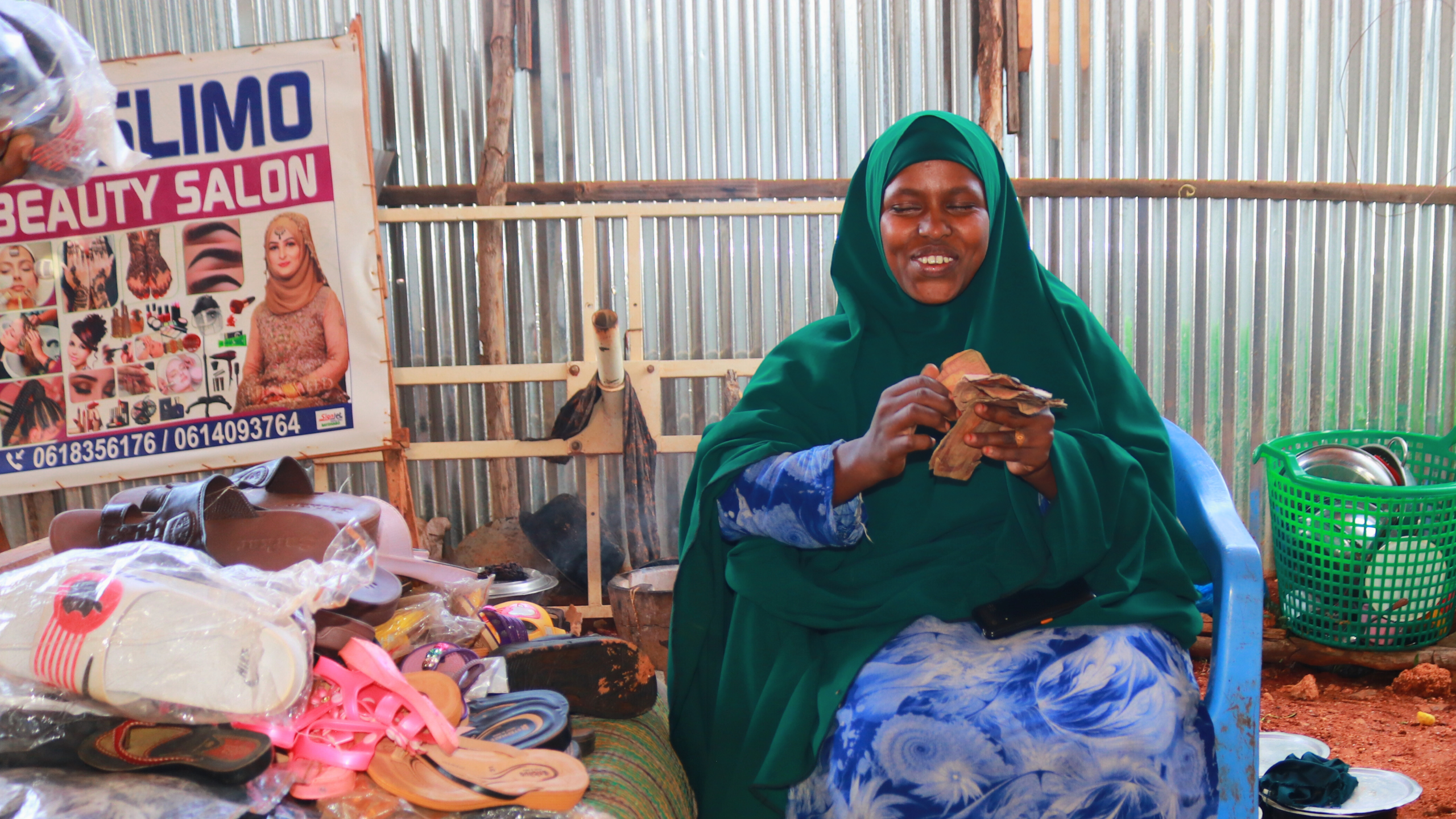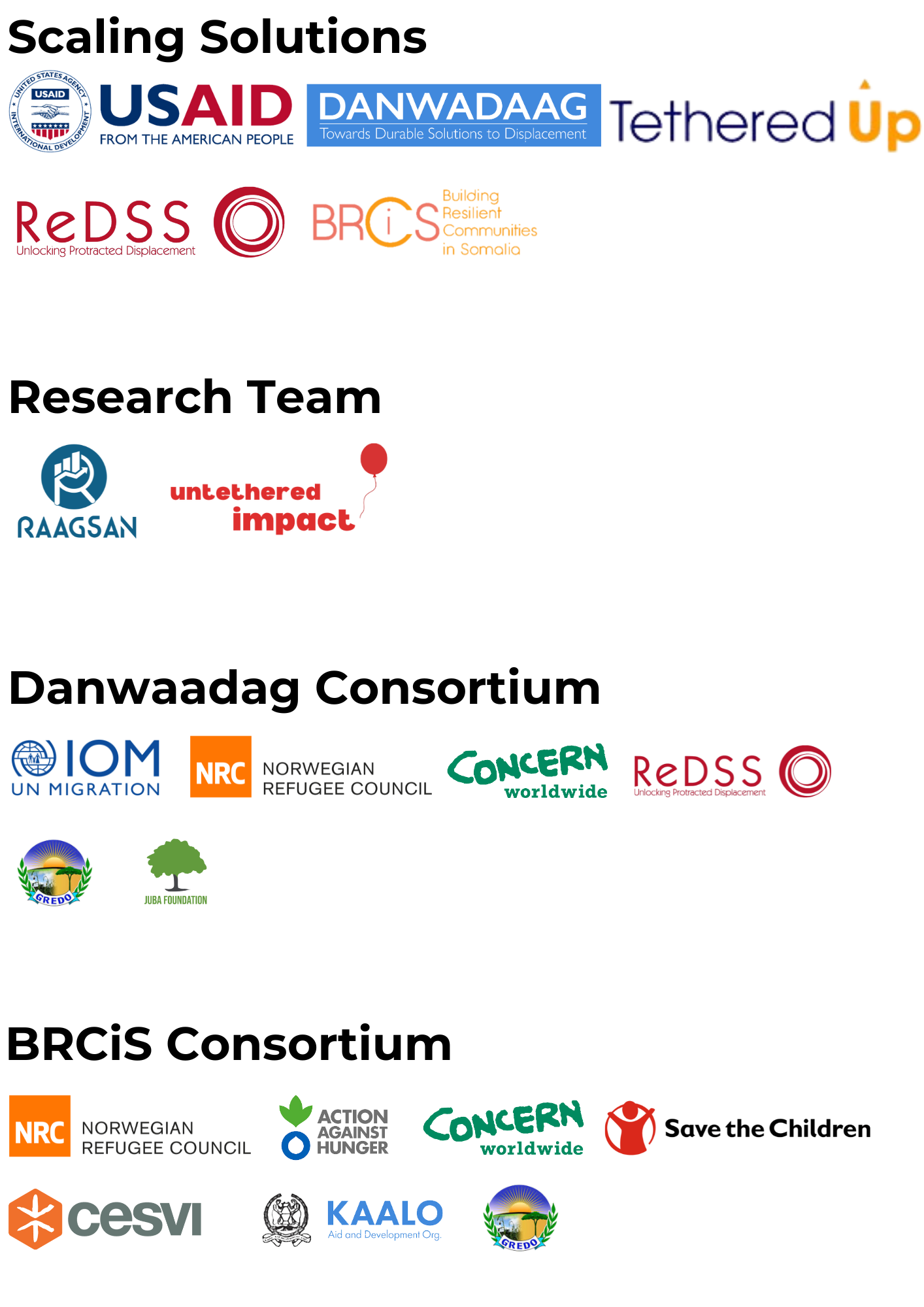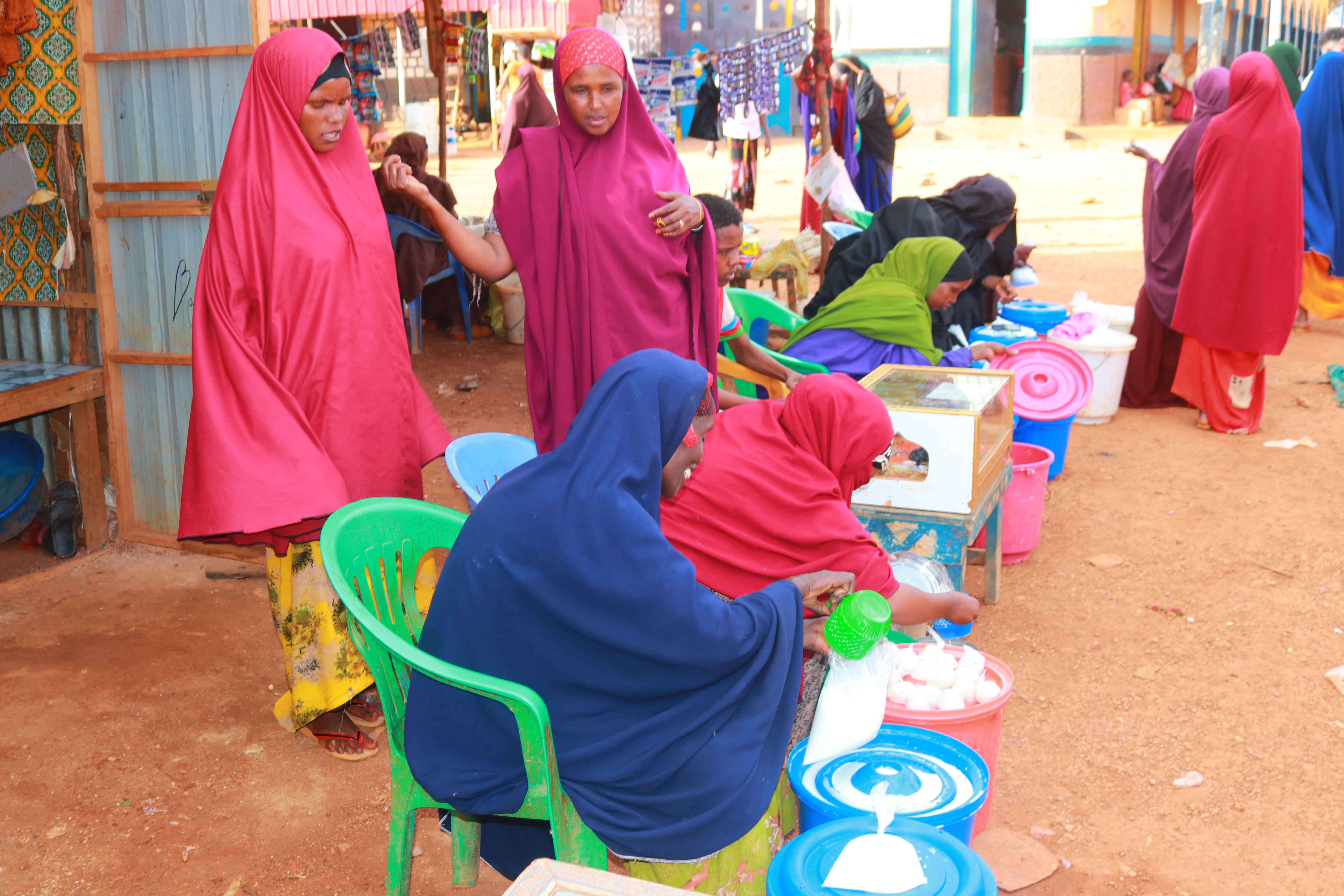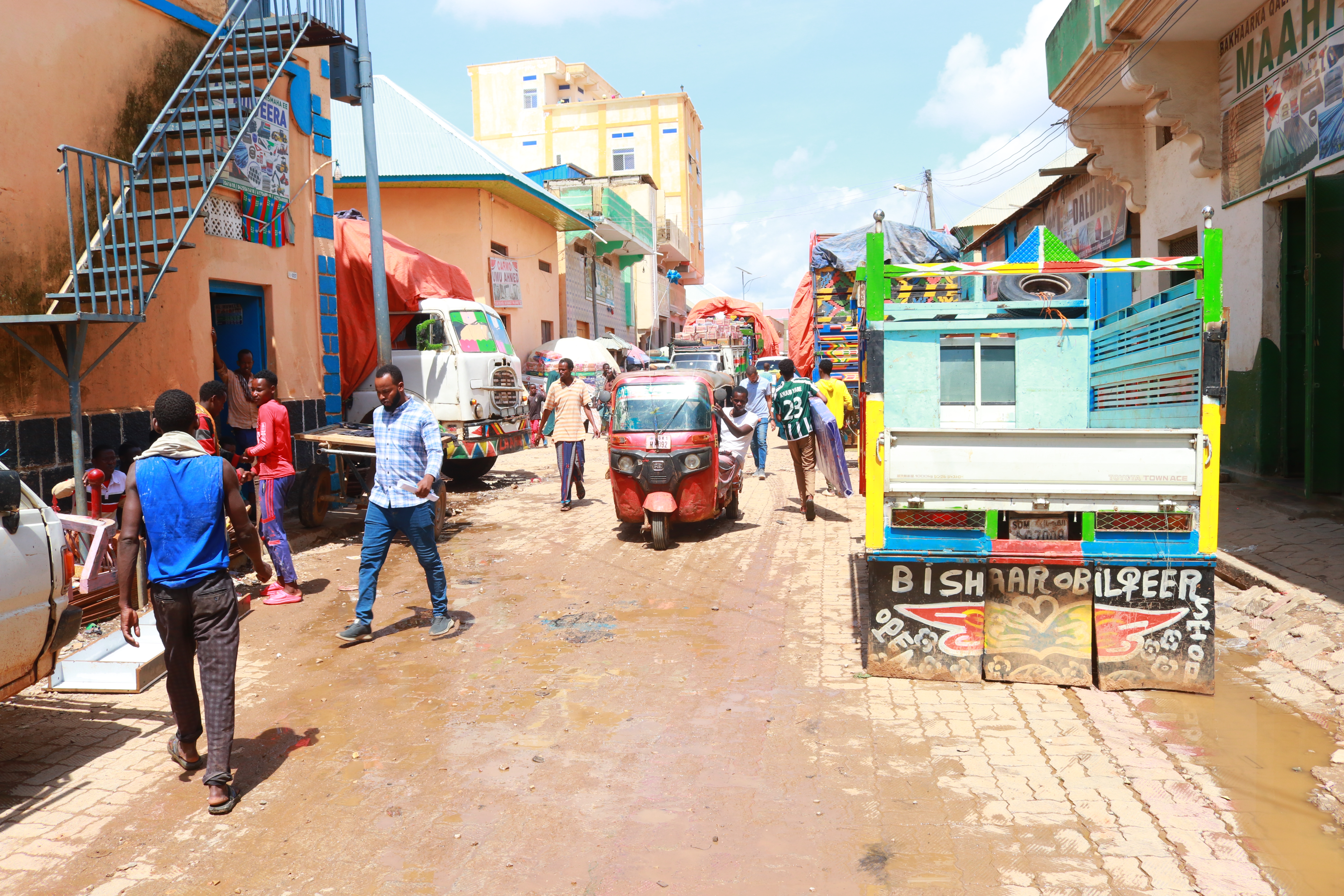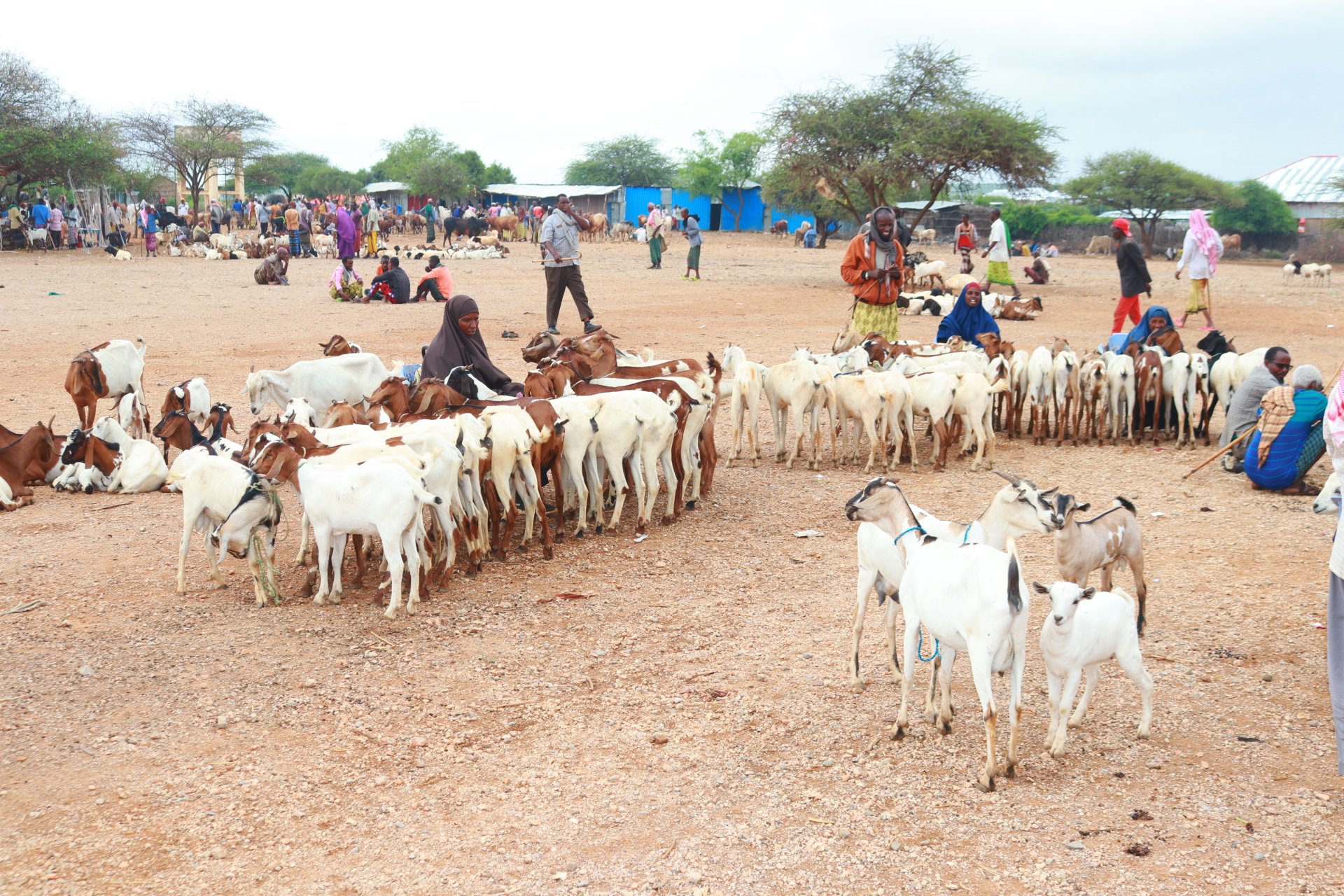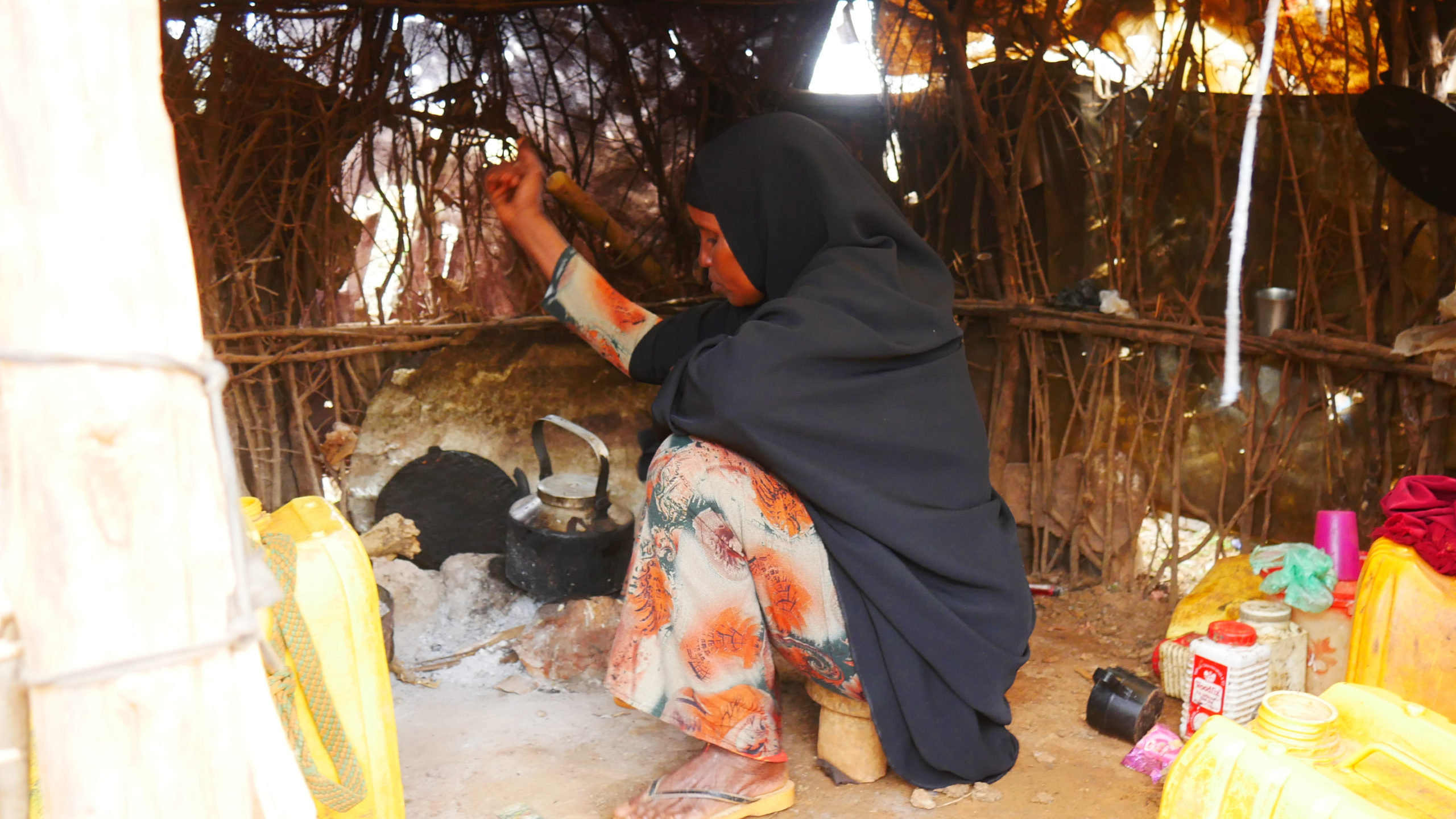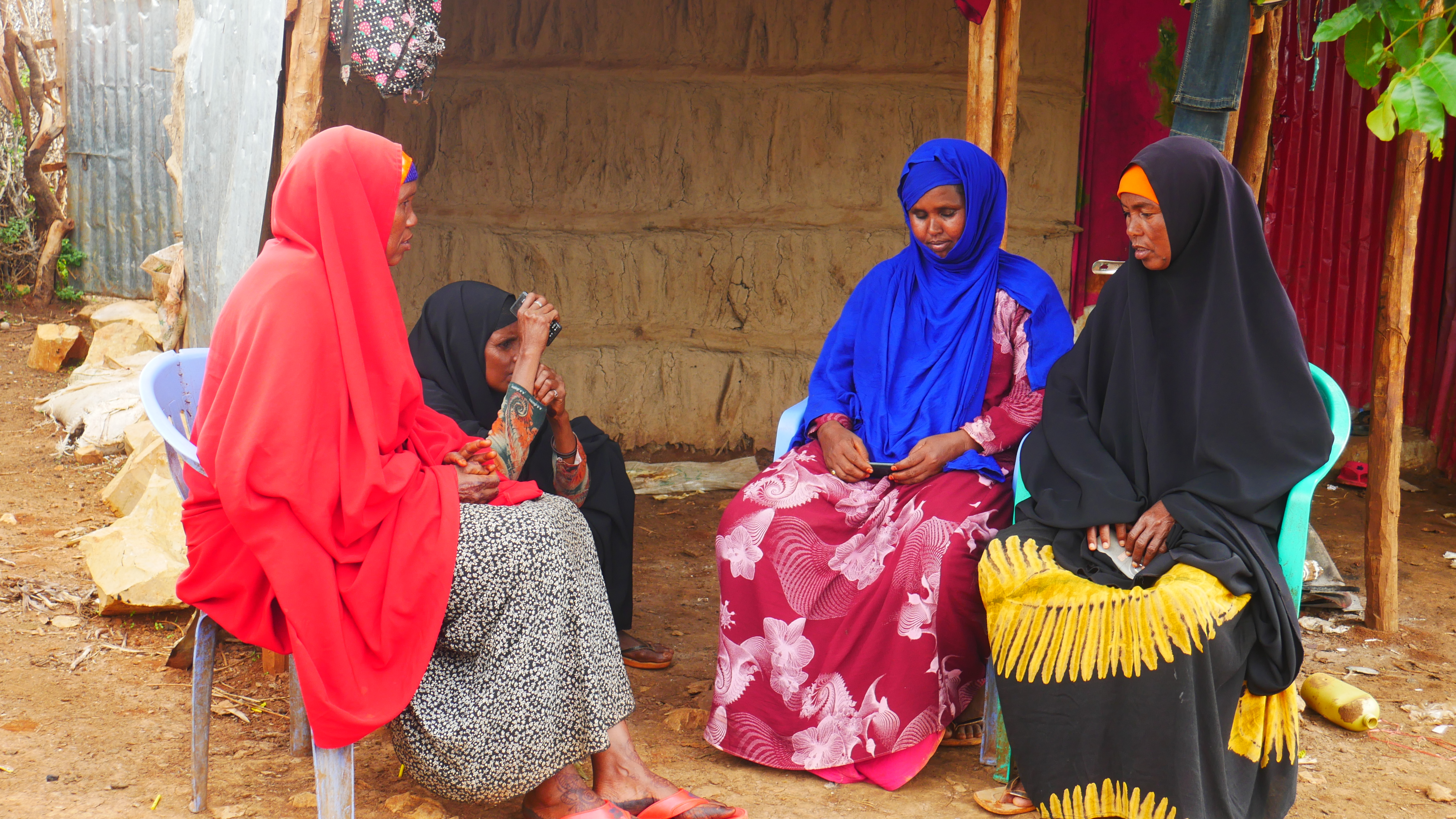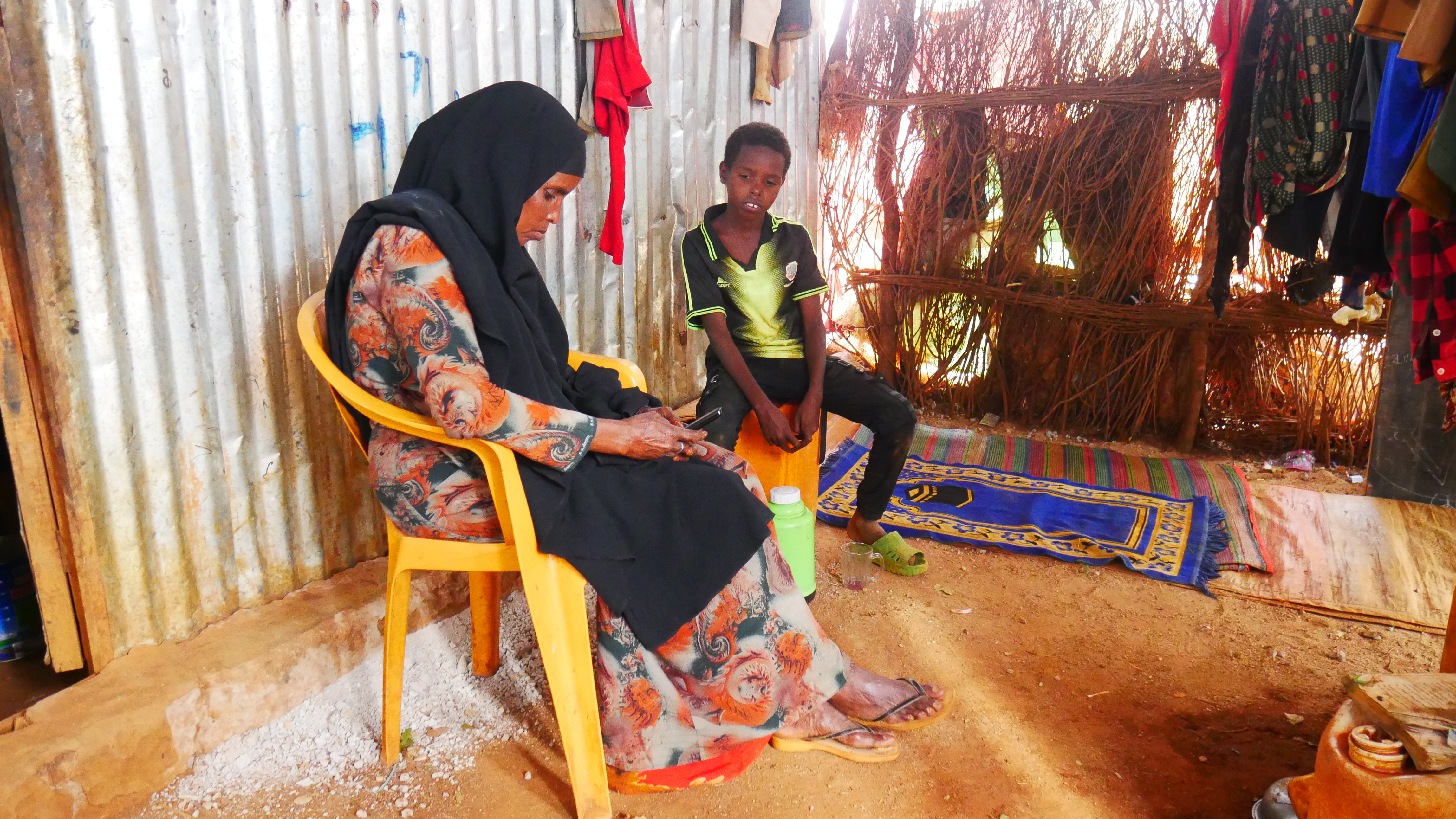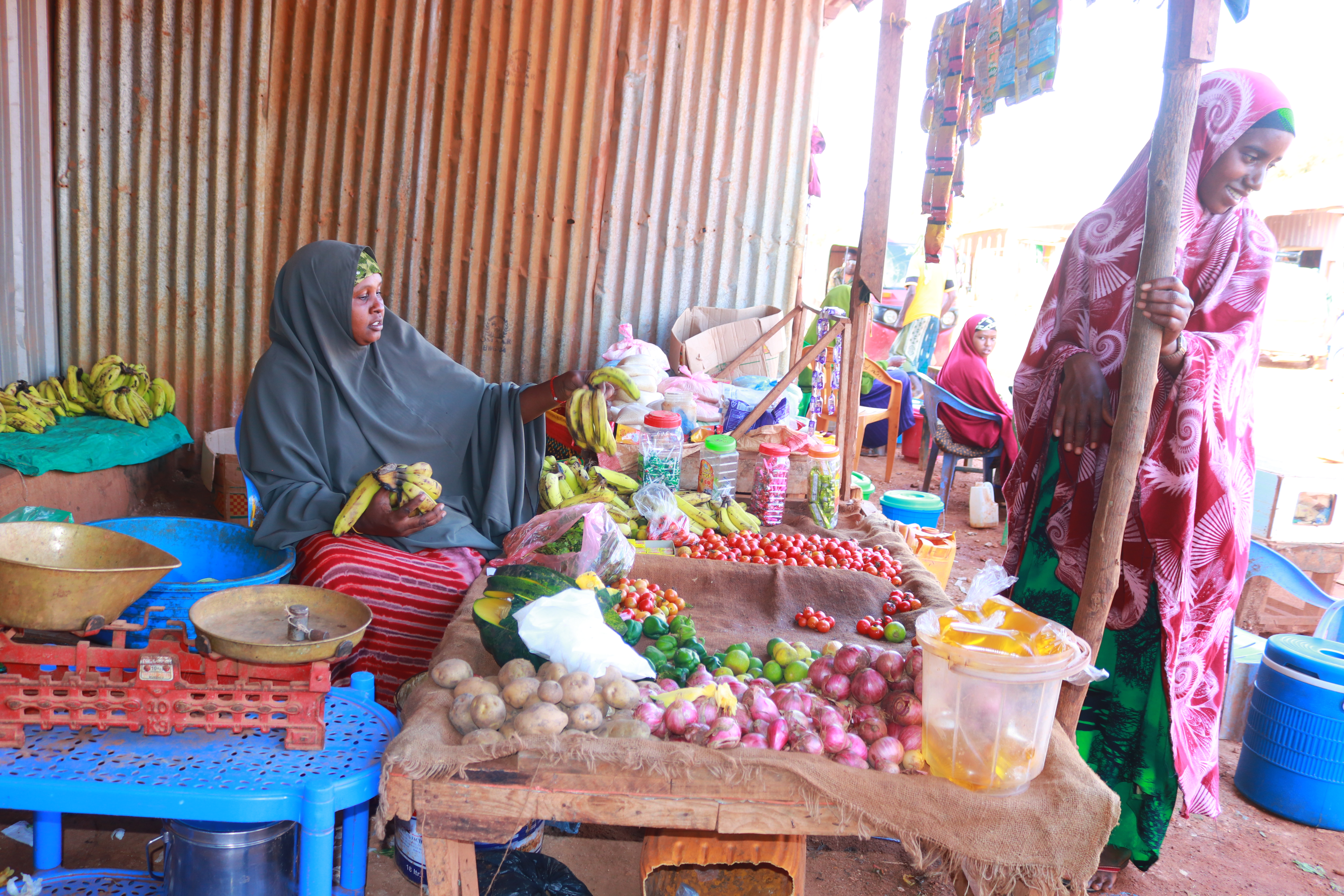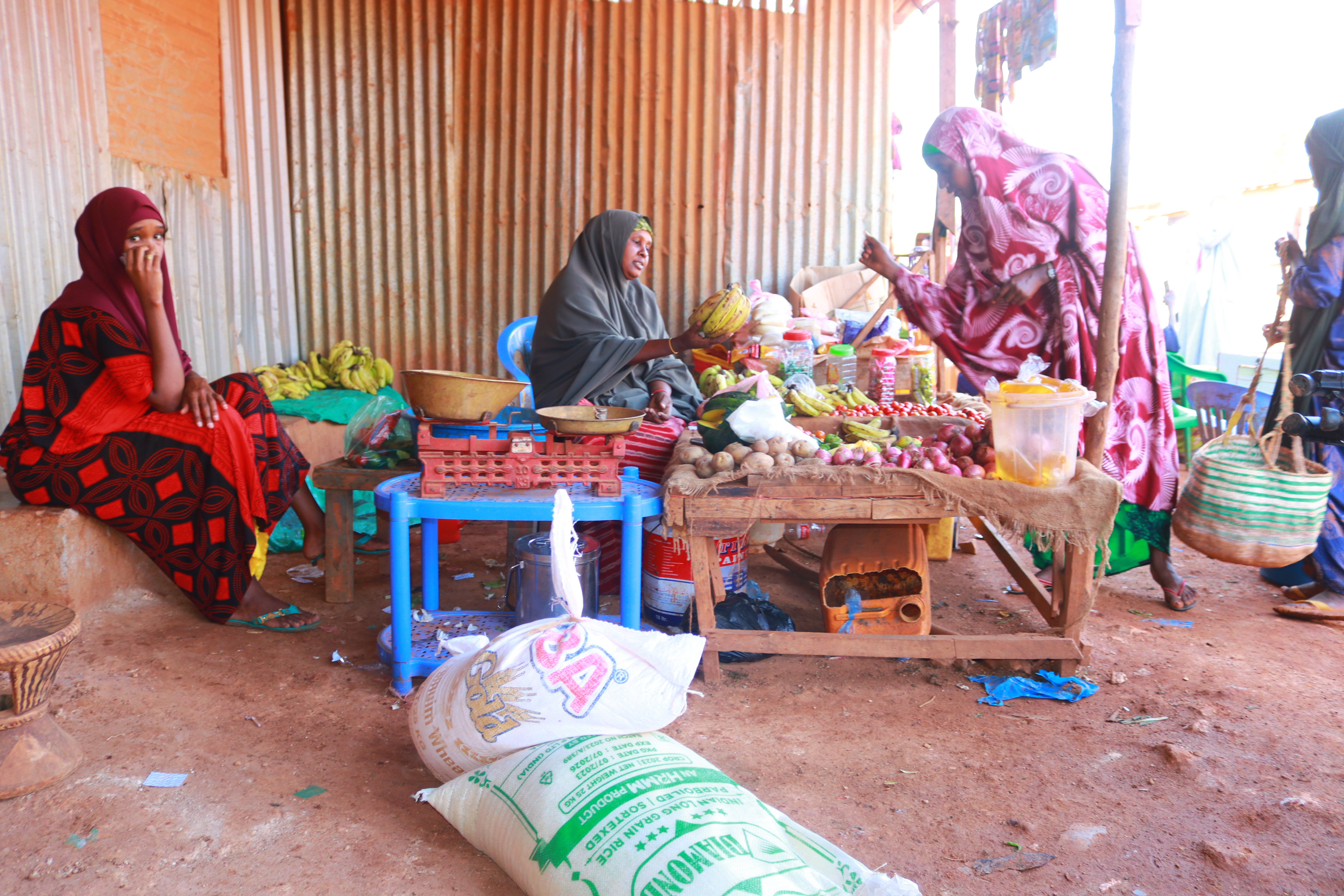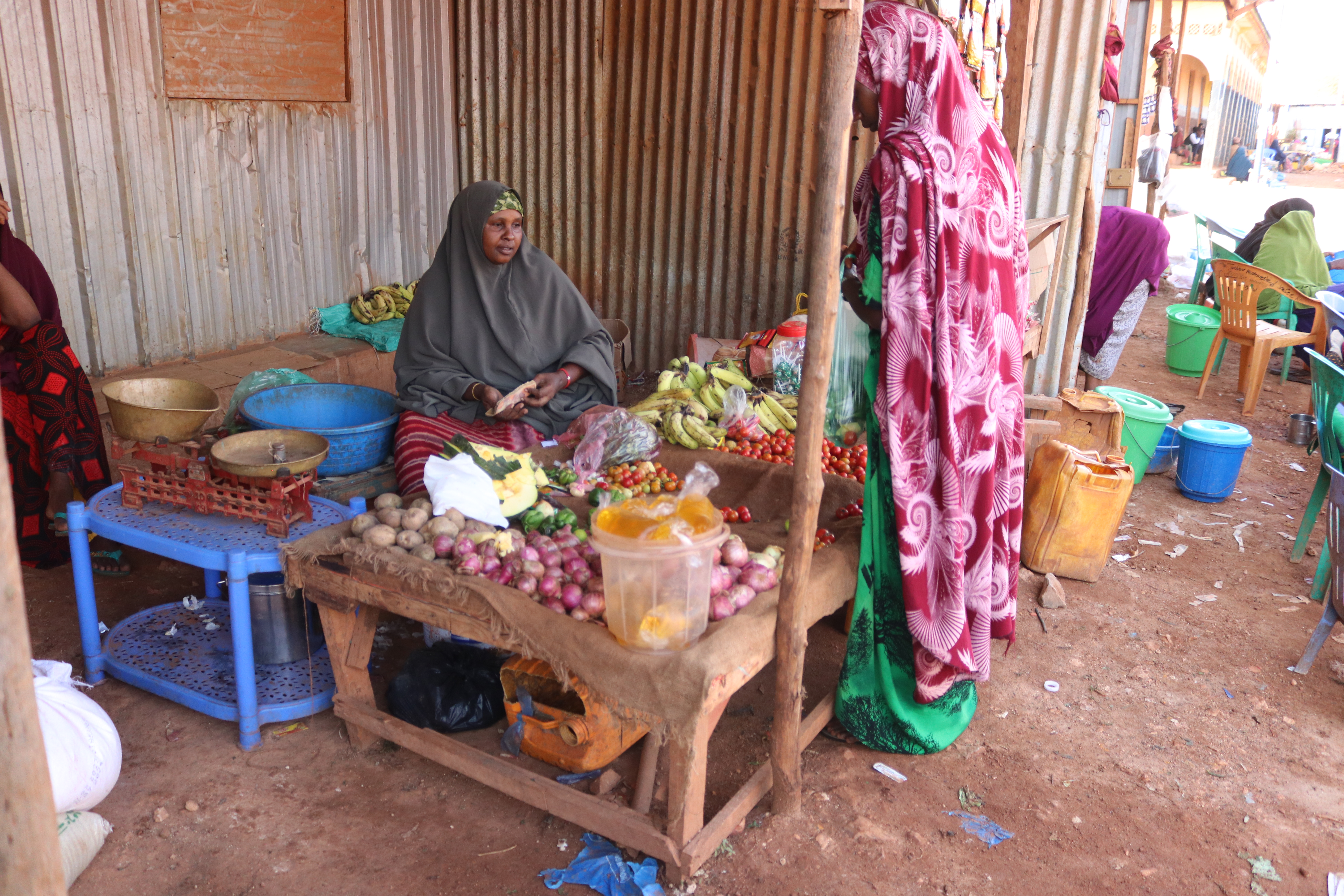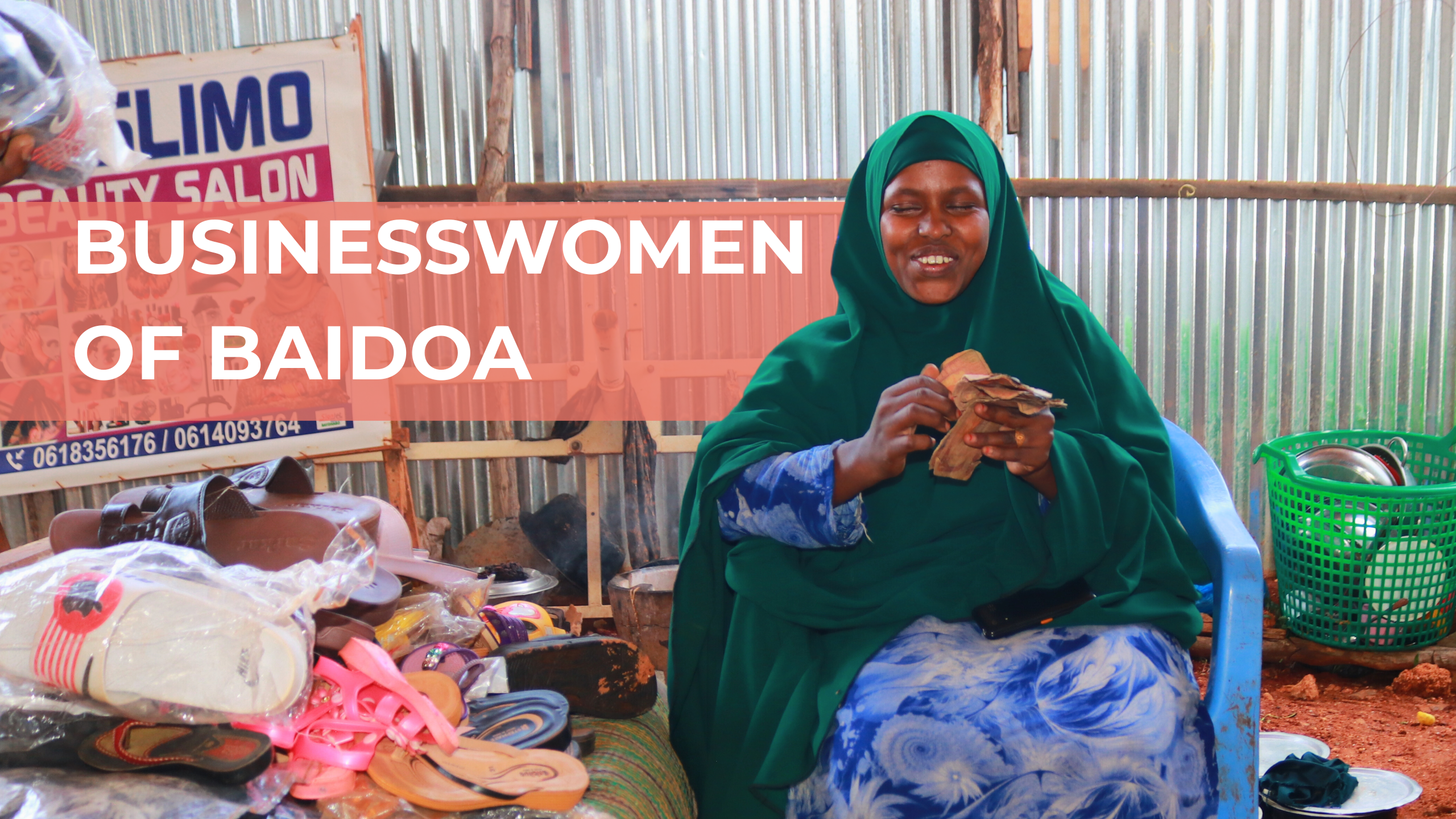
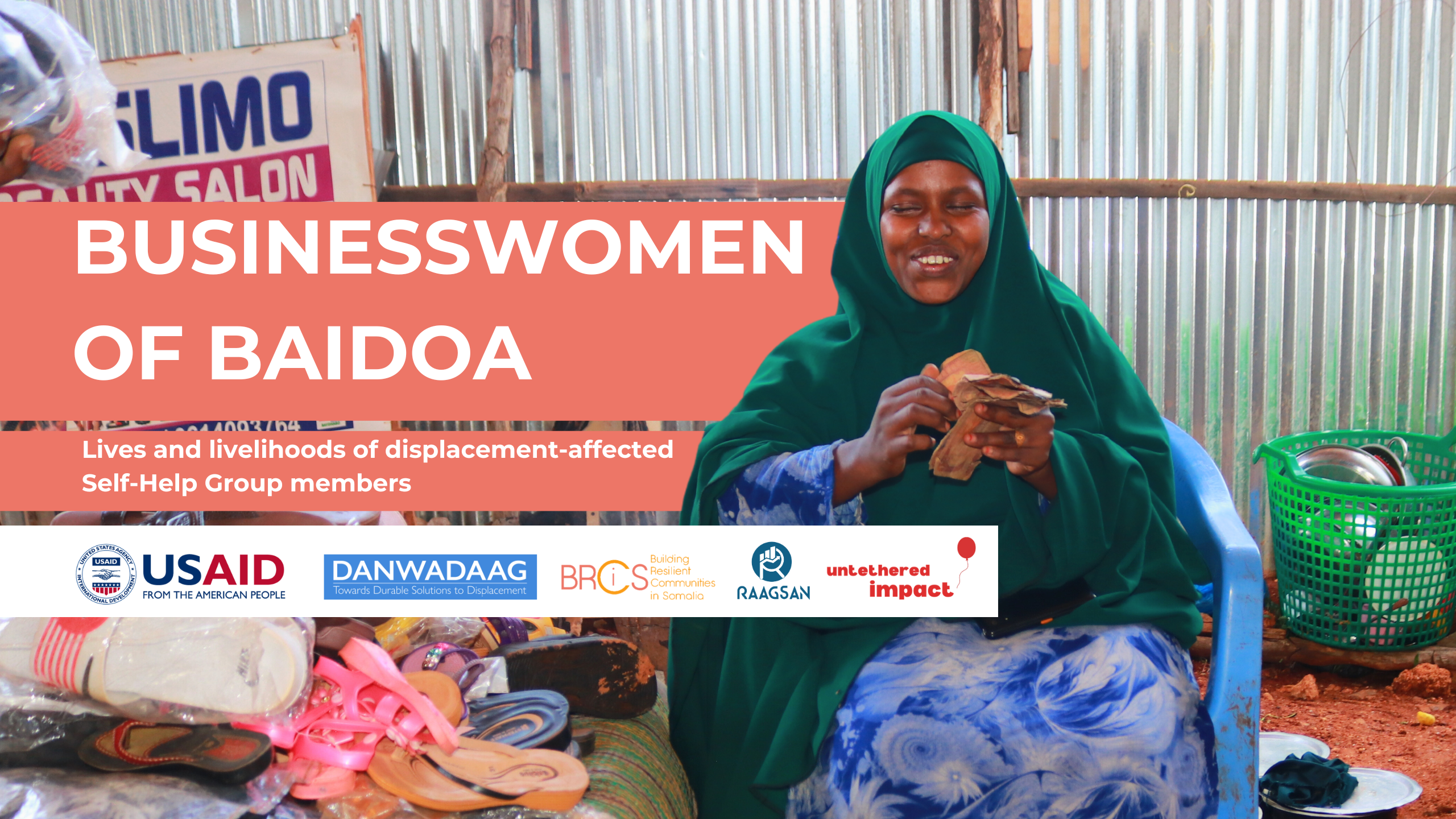
This interactive report is best viewed on a desktop or laptop.
Hello, my name is Ayaan, and I am a researcher in Mogadishu, Somalia. As part of the first year of the Scaling Solutions in Somalia project, my team undertook a six-month long, multi-phased human-centered design exercise in partnership with four Self Help Groups (SHGs) of women from displacement-affected communities (DACs) in Baidoa Town and key informants from the local economic and development system.
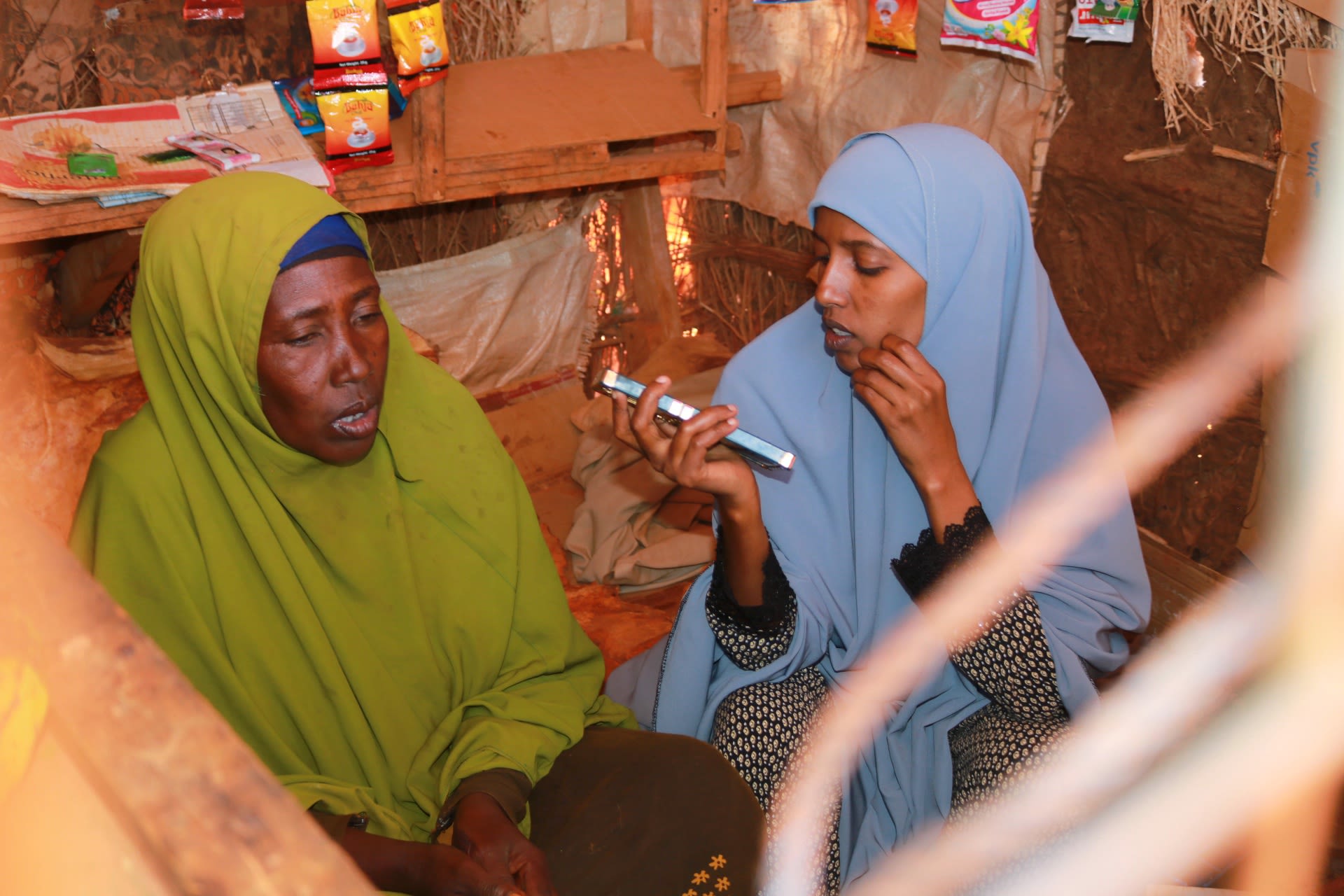
Interviewing one of the SHG members. Photo: Abdiaziz Abdinur Mohamed.
Interviewing one of the SHG members. Photo: Abdiaziz Abdinur Mohamed.
- To start, we carried out a comprehensive desk review and a four-day scoping visit to Baidoa Town to meet with representatives from the four SHGs in initial focus group discussions and speak with traders to better understand the rural-urban market system.
- Two months later, we returned for more extensive, participatory research, which included additional focus group discussions and in-depth interviews with 39 women from the SHGs as well as interviews with 16 of their suppliers and transporters and 18 key informants to better understand the women’s lives, livelihoods, and market and rural connections.
- The following month, we took our third trip to Baidoa to host a co-creation workshop, bringing together 16 of the SHG members; 10 participants from local financial service providers, training organizations, and government; and 8 NGO representatives to collaboratively generate ideas for durable solutions that could improve the women’s lives and livelihoods and support the rural-urban system.
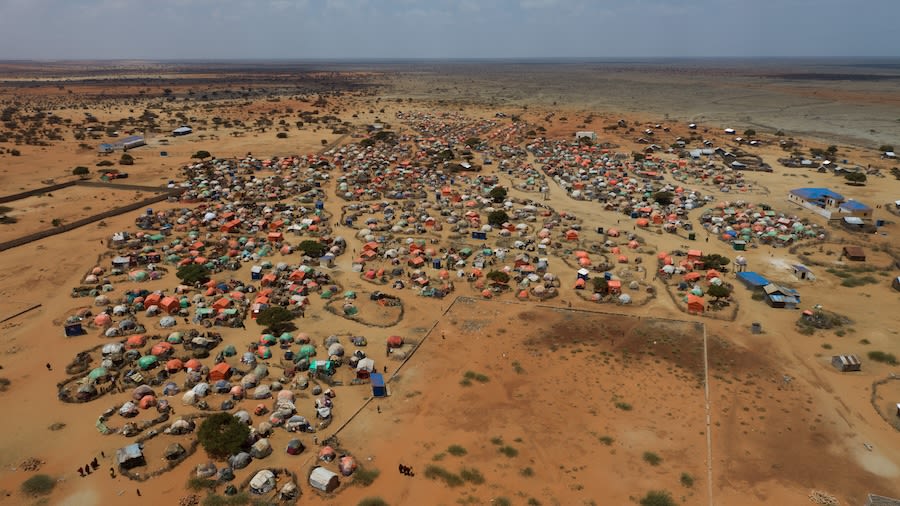
An IDP site near Baidoa. Photo: Abdulkadir Mohamed/NRC.
An IDP site near Baidoa. Photo: Abdulkadir Mohamed/NRC.
When we started this endeavor, my colleagues and I had a lot of pre-conceived ideas about what we would find. Baidoa has been at the center of the displacement crisis resulting from the 2021-23 drought and ongoing conflict, and we had heard that many people are experiencing profound distress. During the research phases, we realized that while many of the women we met are struggling to provide for their families’ basic needs, most of them have relatively stable lives, and some have become quite successful.
We were reminded that the women had good lives and livelihoods before they had to leave their homes and that they brought with them skills, personal and professional networks, the desire to connect with and support others, and resilience capacities that have carried them through their challenges. These have been nurtured through the SHGs they’ve joined and the businesses they’ve started, which are encouraging them to work toward goals, see opportunities where they had once only seen challenges, and flourish, taking pride in their ability to support their families.
My colleague, Mohamed, shared his experience from the research in this video:
Thank you for taking the time to allow me to tell you more about what we learned, to introduce some of the women we met, and to share the ideas that they and representatives from other local organizations came up with to improve the lives of other women DACs in Baidoa.
To maintain their confidentiality, the names, identifying details, and photos of the women have been changed. Their stories are constructed from in-depth interviews but are based as much as possible on original quotes.
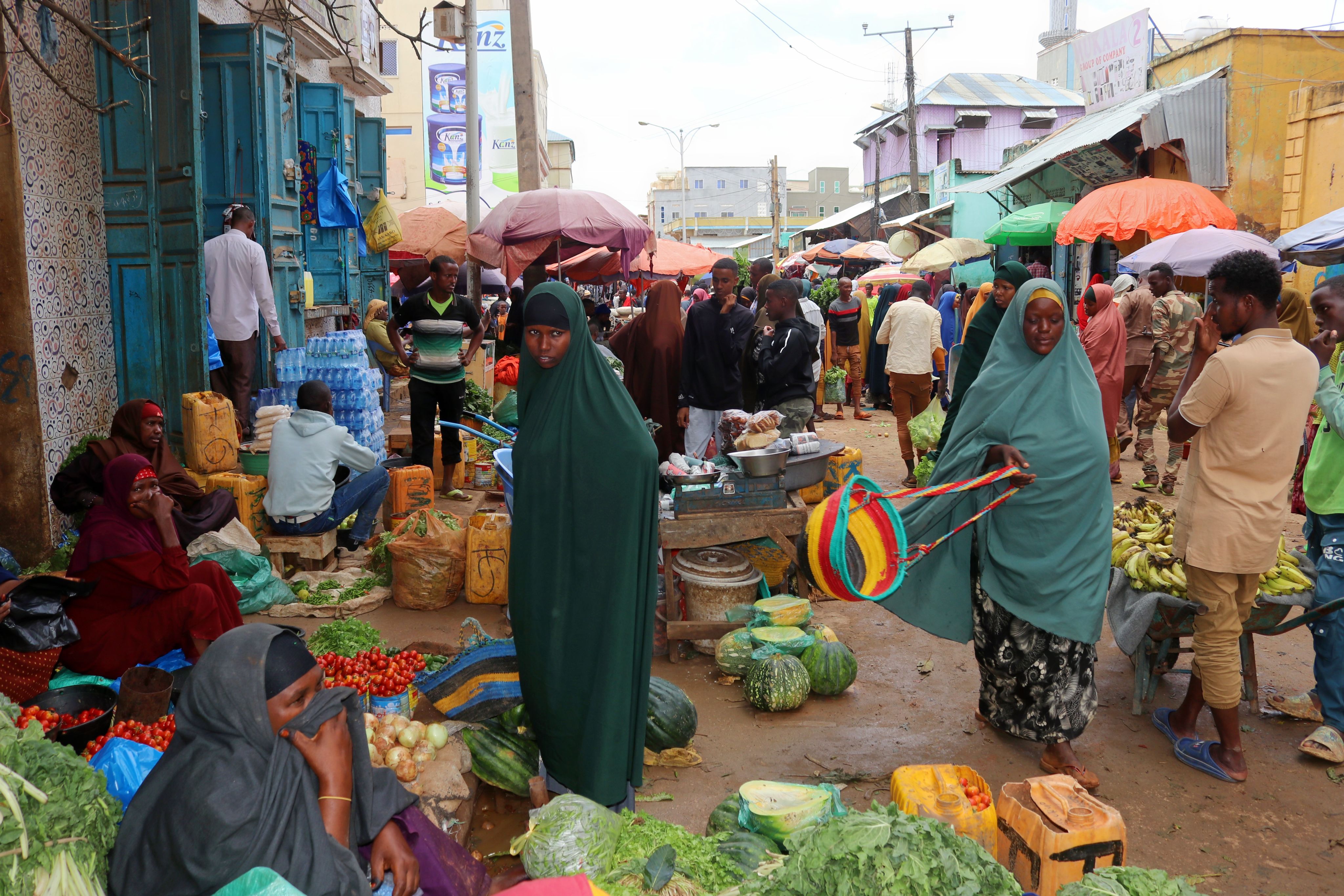
Since it takes time for people who are displaced to settle and join a SHG, nearly all of the women we met arrived in Baidoa Town before the recent drought, some as early as 2006. While many came from elsewhere in Baidoa District, others traveled further, from surrounding districts in Bay, Bakool, and Gedo Regions, with some from even further afield.
Having left their homes because of drought and/or conflict, they brought with them skills and indigenous knowledge related to their traditional livelihoods, mostly farming and livestock husbandry, as well as their experiences maintaining households and raising their children. While some of these are no longer used, many women have adapted these to their urban environments.
Most of the women are now trade-based micro-entrepreneurs or petty traders, selling goods originating from surrounding rural areas such as vegetables, cereals, firewood, and milk as well as imported items such as bagaash, chewing gum, cleaning detergents, and clothing. While most seem to have one primary livelihood, such as trade, many are engaged in multiple value chains, for example selling both ‘rural’ and ‘imported’ goods. Most are the primary income earner for their families and earn enough to cover their basic needs, but only just. Others struggle to provide even this.
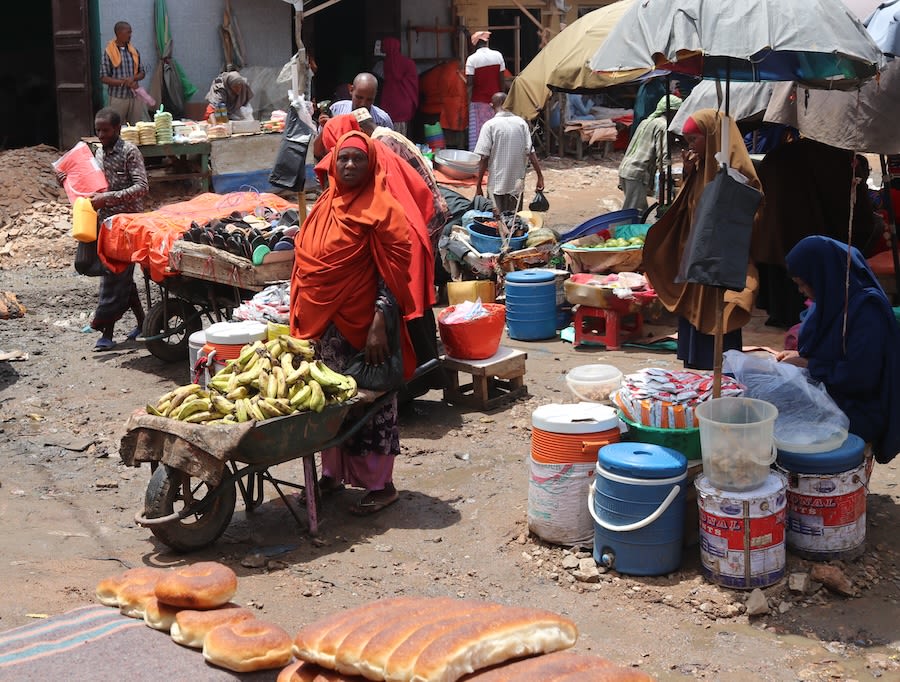
Women DACs sell various goods, from bread and fruits to imported goods and sweets. Photo: Khalid Abdi Ibraahim.
Women DACs sell various goods, from bread and fruits to imported goods and sweets. Photo: Khalid Abdi Ibraahim.
While access to formal financial services is minimal, trade credit is an essential component of many women’s businesses. In addition to guaranteeing their trade credit, the women’s SHGs have been integral in enabling them to pursue their livelihoods, develop market and social capital, and provide for their families. Their children’s well-being and education are important motivators and strongly influence their decisions.
As one example of one SHG member we met, I would like to introduce you to Zeinab.
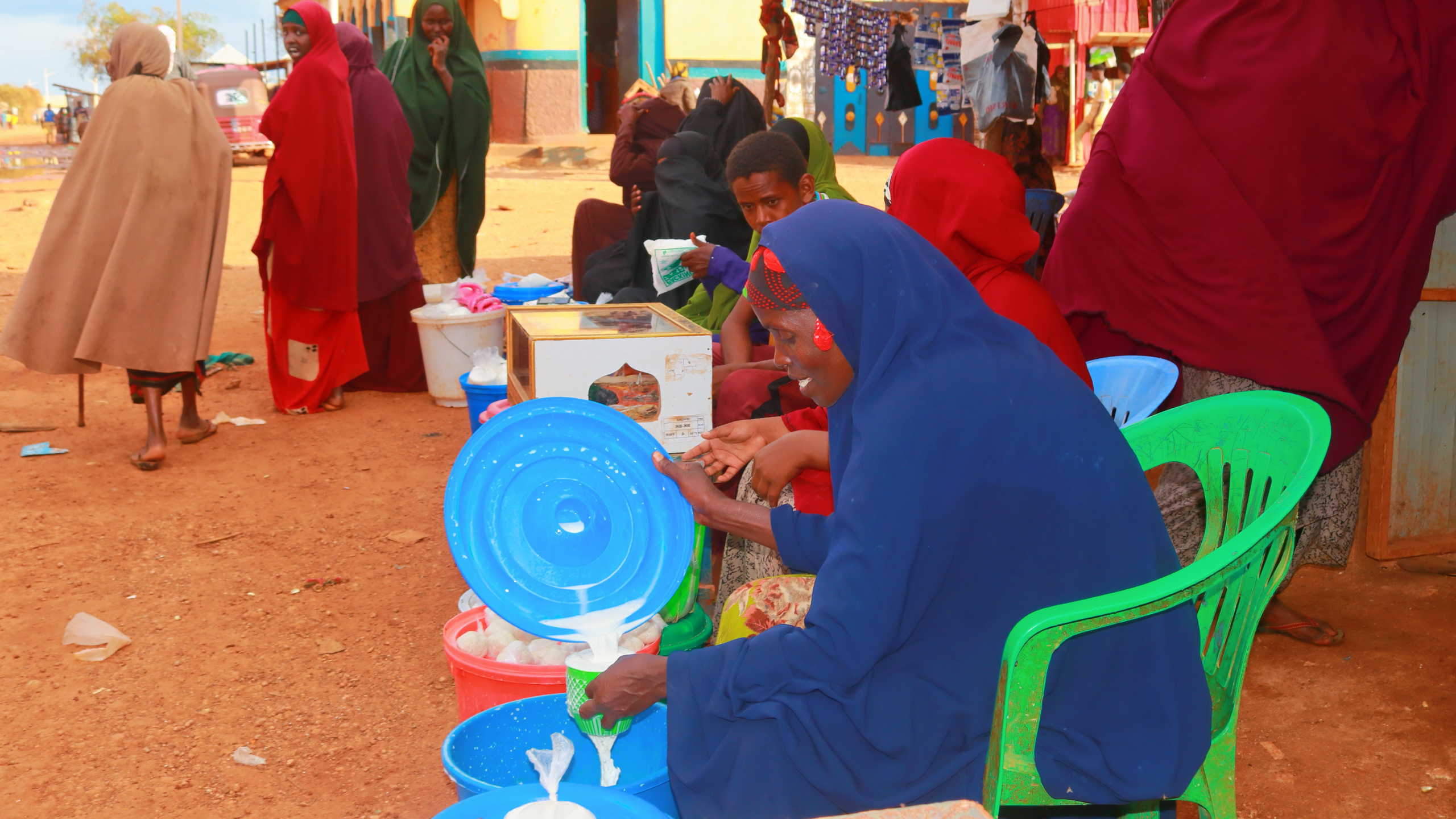
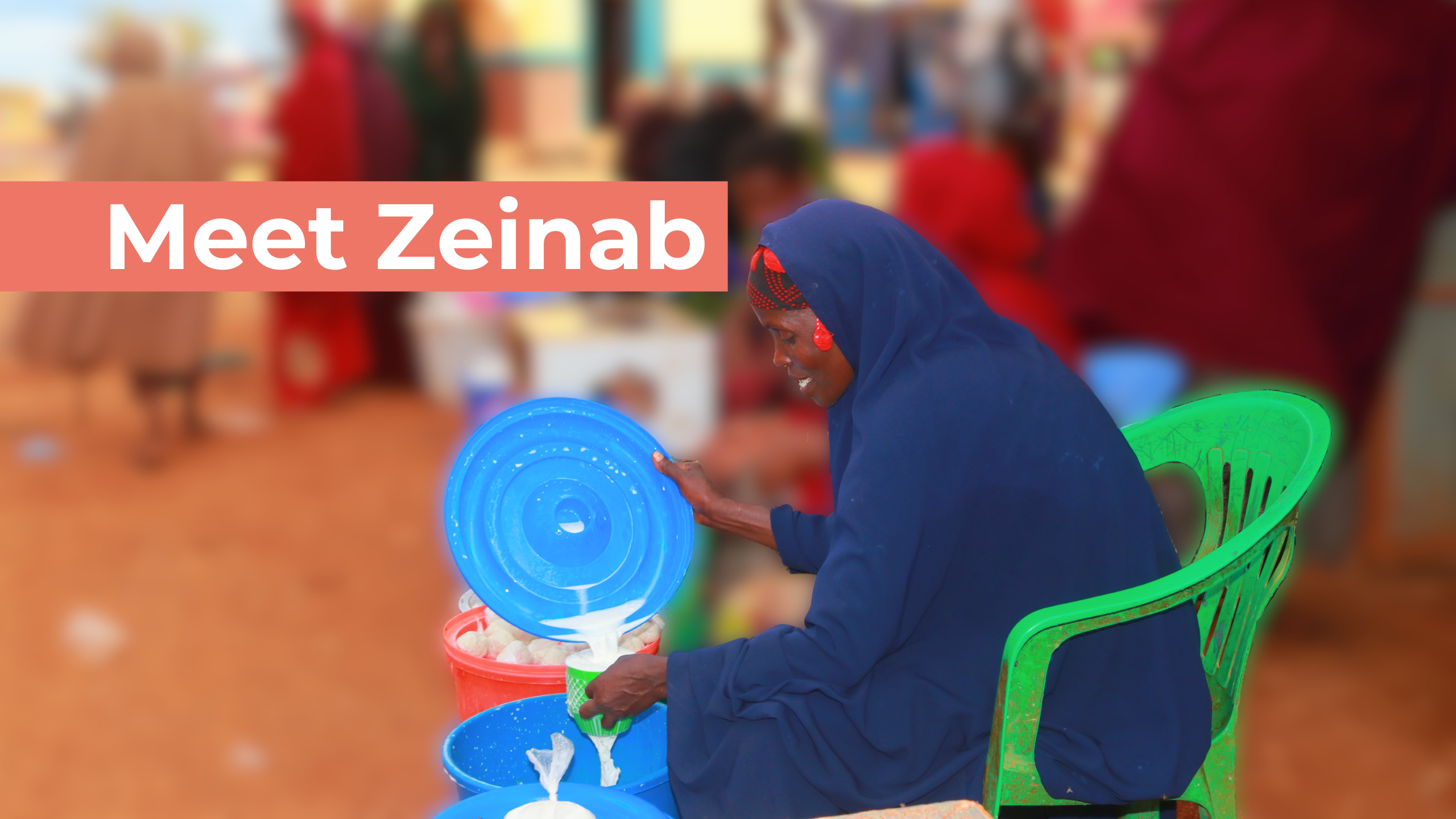
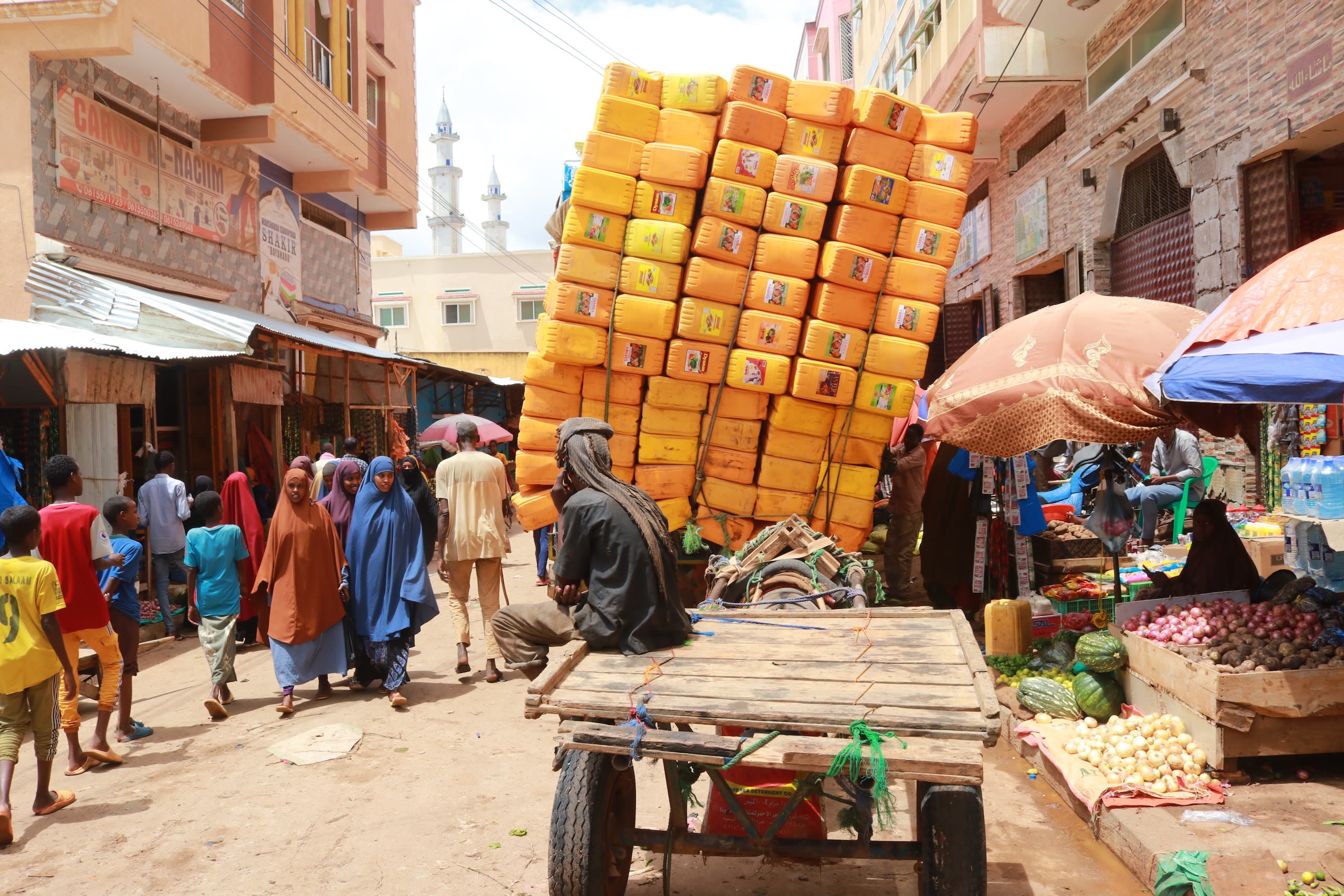
Through this human-centered design exercise, we hoped to learn about many aspects of the women’s lives and to bring them alongside us in the research and project design process. At the same time, we knew that covering so much ground in a participatory format with women who are not literate and are barely meeting their day-to-day needs would take much more time than most studies. To reduce the burden on each participant, we decided to hold several different types of discussions, each covering the various topics of the study. These included half-to-full-day, in-depth interviews with women in their places of business, like Zeinab, and in their homes, like Hawa, who you will meet next.
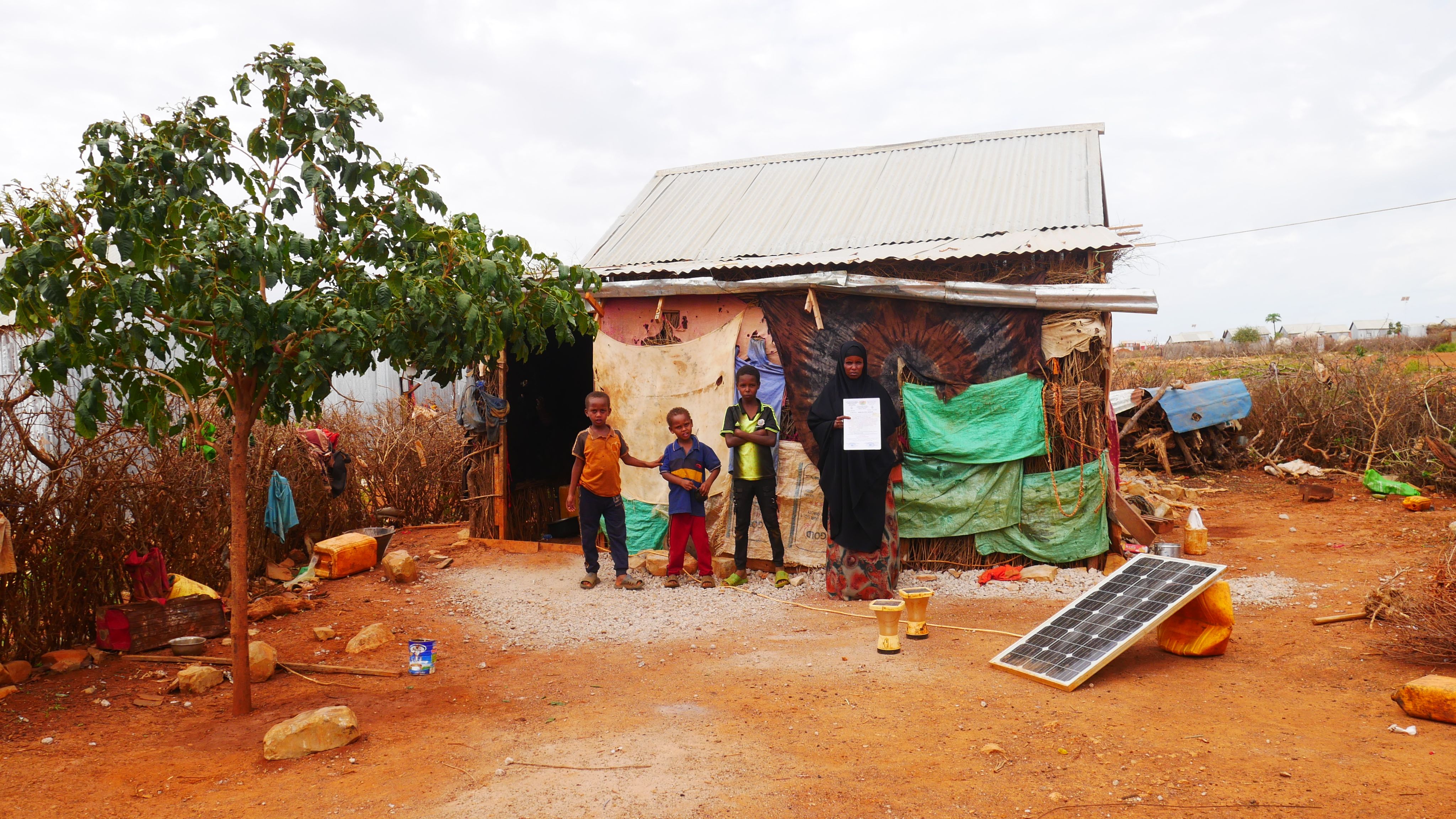
A woman, with her children, shows her land ownership certificate in Barwaqo. Photo: Khalid Abdi Ibraahim.
A woman, with her children, shows her land ownership certificate in Barwaqo. Photo: Khalid Abdi Ibraahim.
Since moving to Baidoa Town, a third of the women have experienced eviction—some multiple times. However, most have since attained some form of secure land tenure, in part with the support of durable solutions actors.
Two of the SHGs are based in the relatively new resettlement site of Barwaqo, currently home to around 2,000 of the roughly 600,000 displaced people in the city, and the other two are based in internally displaced persons (IDP) sites in Baidoa Town itself. Even though some of the women we met are still struggling to meet their daily needs, since nearly all have benefitted from multiple layers of durable solutions and resilience programming, they are in relatively stable situations.
Some of the women are cultivating kitchen gardens or small home plots, or keeping livestock at home for domestic use, but nearly all would like to have access to land for cultivation.
Given their length of stay in Baidoa, secure land tenure, and other identity-related considerations, only half of the women we met view themselves as internally displaced persons (IDPs), while others consider themselves to be ‘resettled’ or members of the host community. This is mixed across women living in IDP sites and Barwaqo.
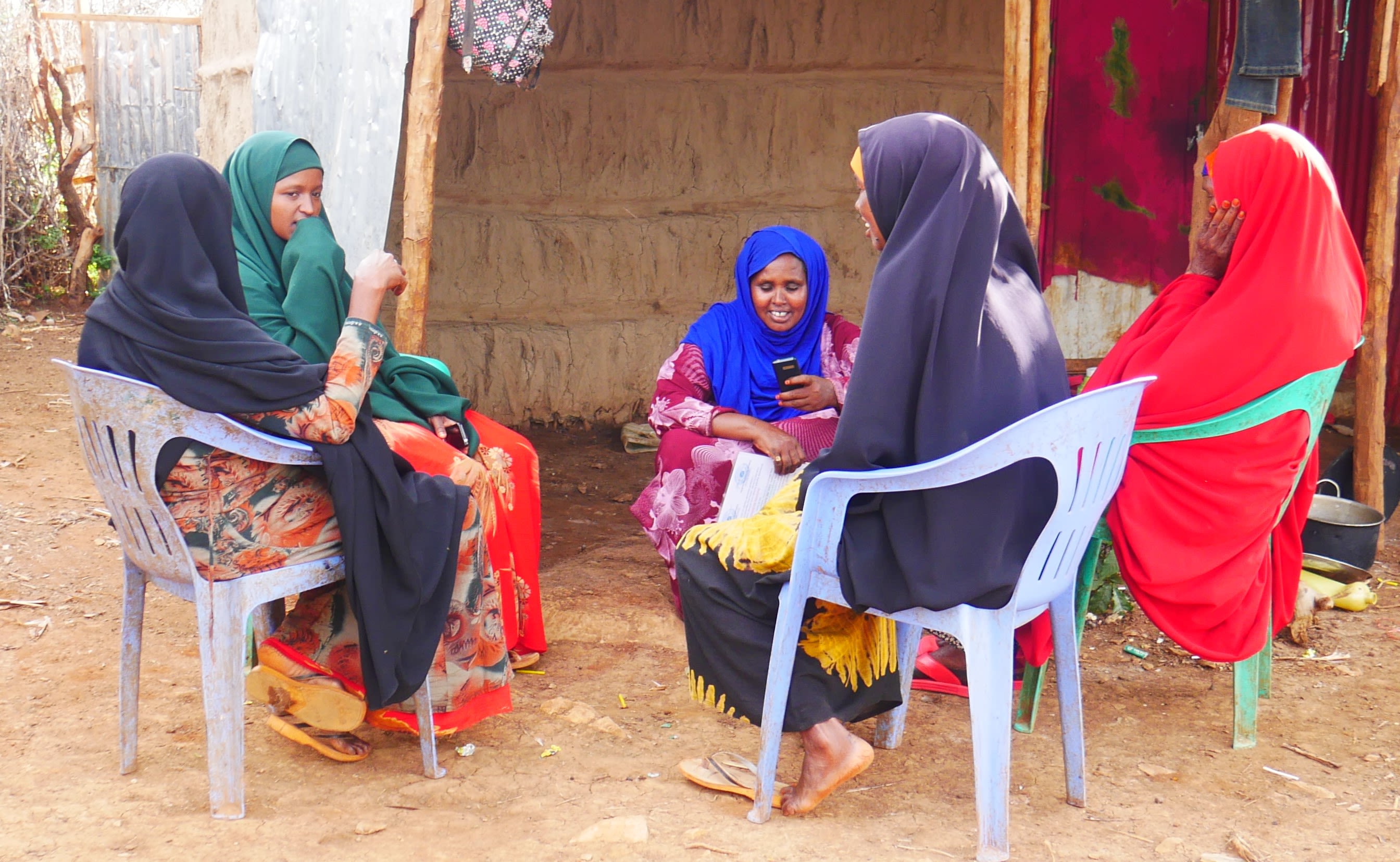
Members of a self-help group meet outside a tea stall. Photo: Khalid Abdi Ibraahim.
Members of a self-help group meet outside a tea stall. Photo: Khalid Abdi Ibraahim.
From our many conversations, it is clear that most of the women feel a strong sense of belonging. The local culture prioritizes trust and loyalty, so many prefer cultivating fewer, but deeper, social, business, and rural relationships. Few shared that they had ‘many’ connections of any type, but most, like Zeinab, reported trusted and loyal relationships with one main supplier, and, like Hawa, expressed a strong sense of belonging in their communities. Even though only one quarter have husbands who continue to live in their rural origins, most of the rest are closely connected to—and experience strong feelings of separation from—other relatives such as parents, siblings, and cousins.
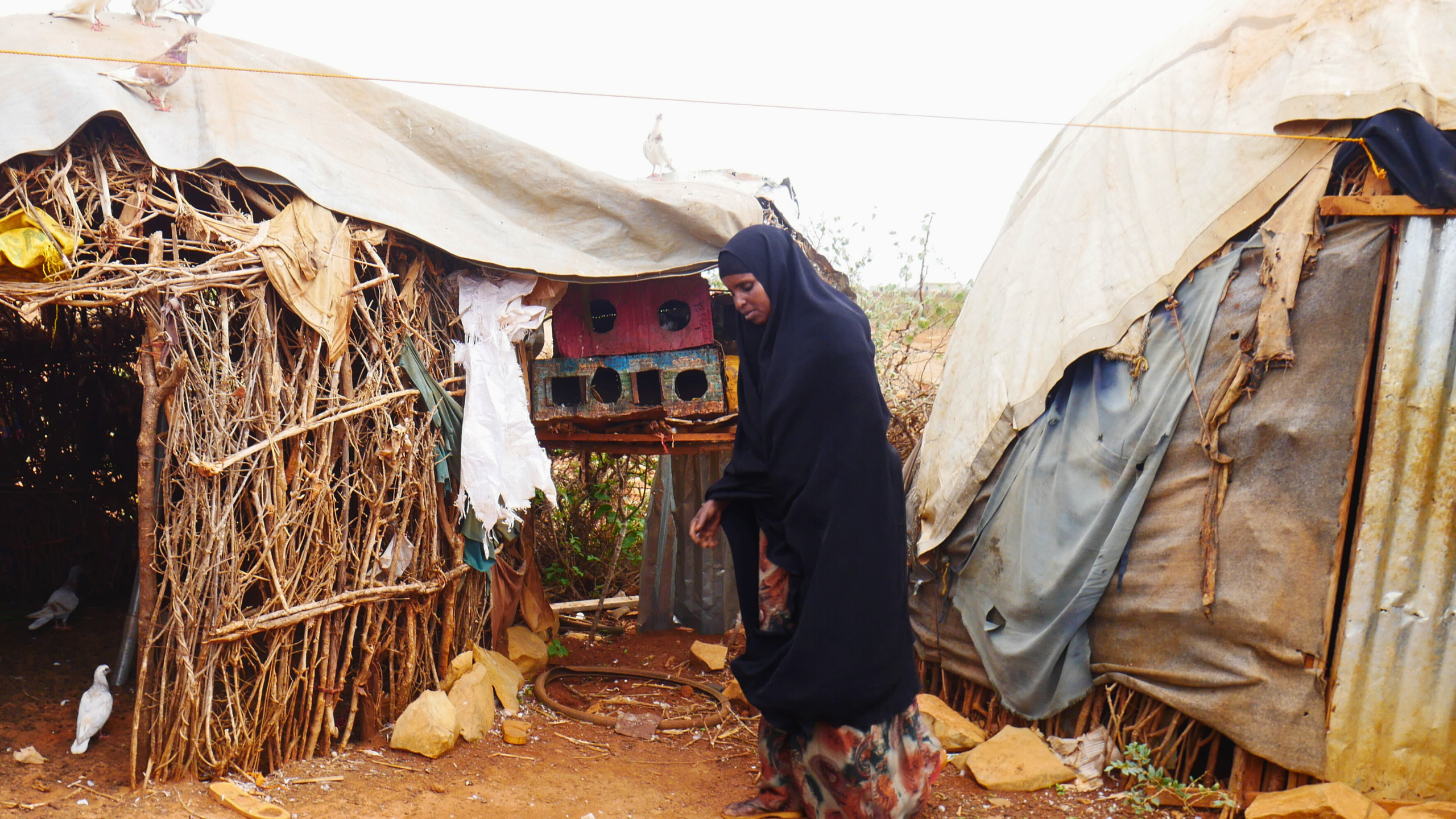
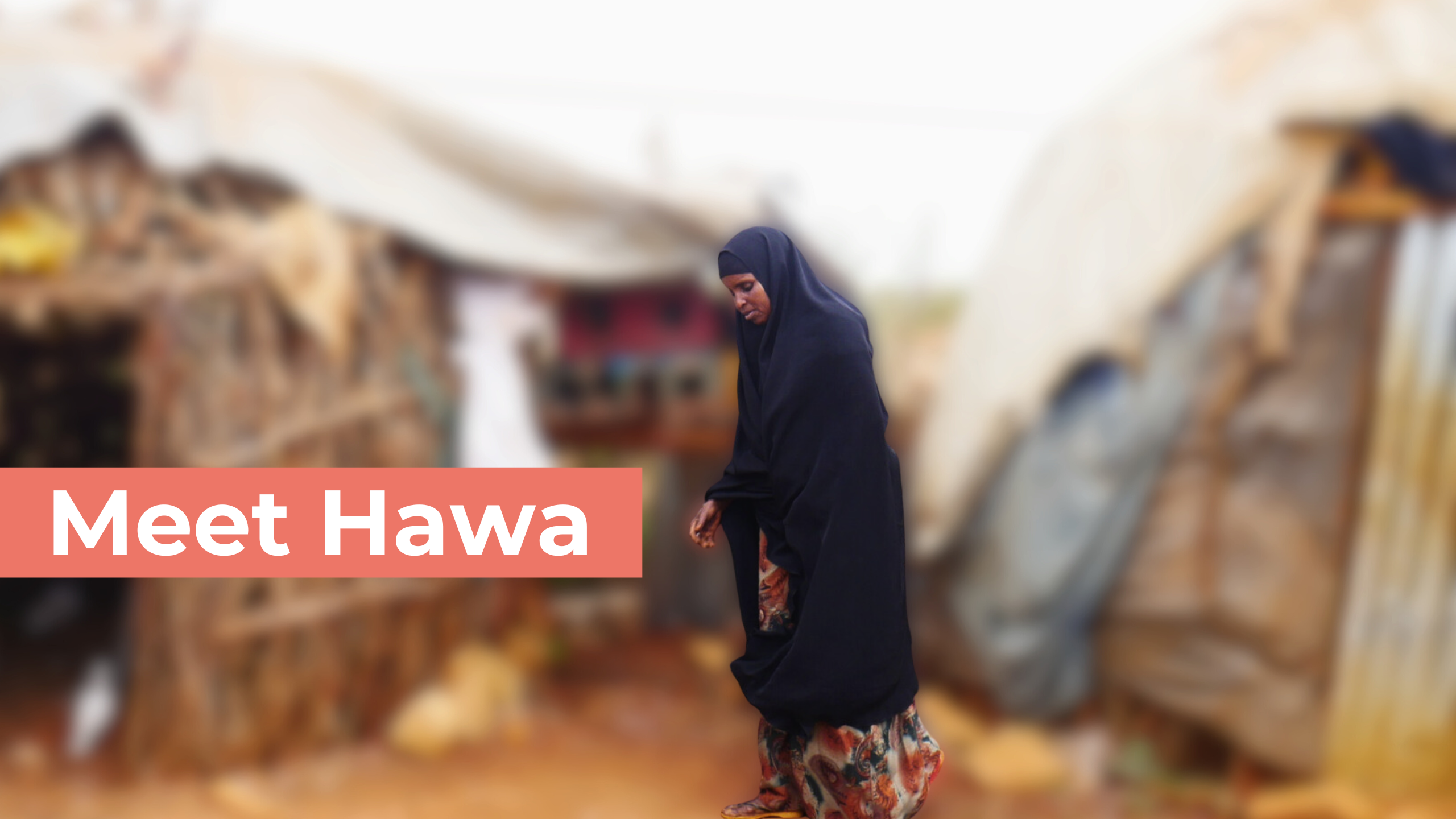
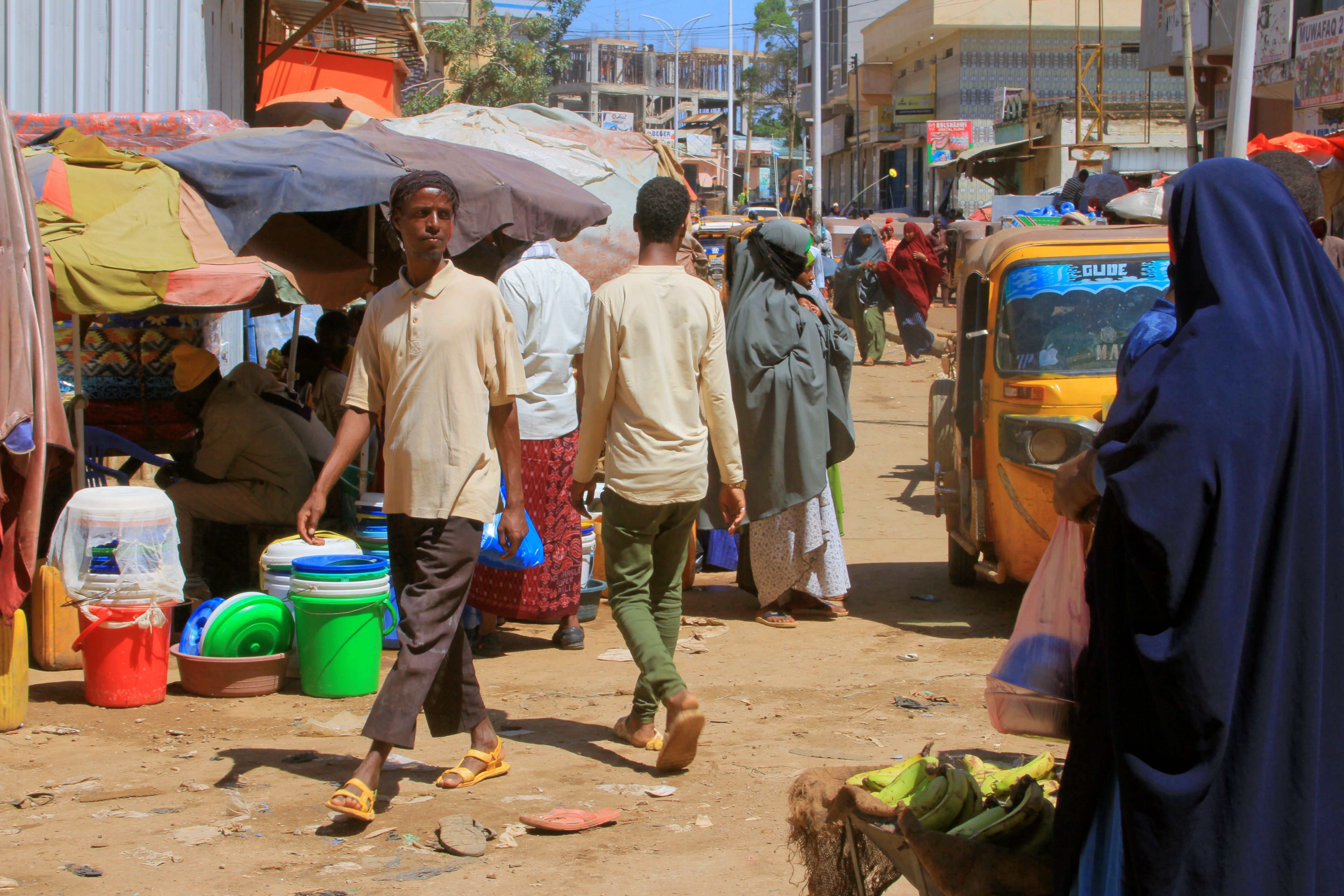
While Zeinab, her SHG sisters, and some vegetable sellers have peri-urban trade connections, and women like Hawa do business in the nearby Hanano 2 mini-market, most of the women’s main suppliers are in Baidoa’s Main Market, located in the southwestern quadrant of the city, or Farshada Qudaarta vegetable market. Others travel to nearby rural markets/villages such as Gofgaduud and Awdiinle, which connect Baidoa Town to surrounding rural districts and, further onward, to Kenya and Ethiopia. While motorbikes often facilitate connections to rural areas, most of the women in the study rely on bajaaj to transport their inventory from these markets to their places of business.
Mobile phones are essential for allowing the women to stay in touch with their family in rural areas and to operate their businesses. Very few own smartphones, but most use their regular phones to call suppliers to check on market prices and trends before traveling long distances to buy inventory and to place orders. About half use Hormuud Telecom’s EVC Plus mobile money service to buy goods, repay trade credit, or accept payments from their customers.
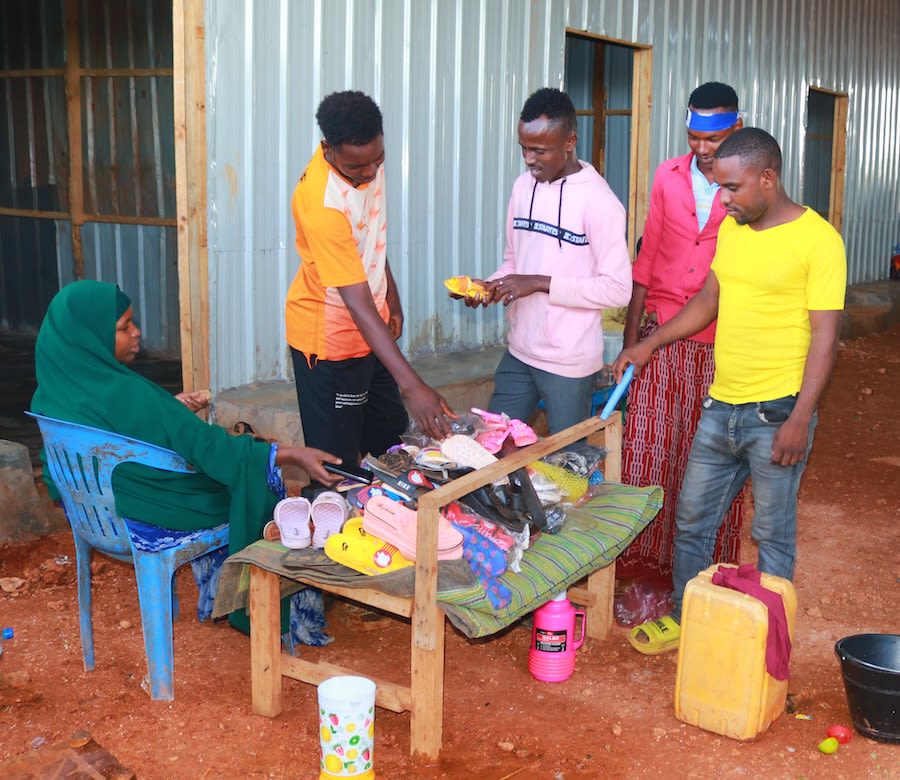
A woman sells plastic shoes in a market. Photo: Khalid Abdi Ibraahim.
A woman sells plastic shoes in a market. Photo: Khalid Abdi Ibraahim.
The women view themselves as being good traders, as they have experience managing their households with very limited resources, patience and resilience, knowledge about their goods and businesses, and ability to convince customers to buy from them. They also avoid taking large, uncalculated risks, and place a great deal of import on maintaining good business relationships and repaying loans on time.
This is recognized by transporters and wholesalers with whom they have cultivated relationships, as well as a few financial service providers, such as Midnimo Microfinance Institution and Amal Bank who have designed special products and services targeted specifically to women IDPs and work directly with some savings groups, although the reach of these formal financial services remains limited.
"There are a few women among the IDPs who run shops within their camps, and they are some of my loyal customers. I trust them so much that sometimes they take my goods and pay me only half of the money, and I wait for the remaining balance until they are able to pay."
- Grocery retailer/wholesaler in Baidoa’s Main Market
"We have chosen to focus on IDP women in our microfinance initiatives primarily due to their remarkable qualities. Women exhibit lower risk profiles than men, often serving as the driving force behind their families' well-being. They also possess good qualities, such as attentive listening and strong focus, which can yield significant benefits when they are well-mobilized."
- Representative from Amal Bank
Of the women with more thriving businesses, most prefer that any additional support be dedicated to expanding their shops. Many have, in some way, been incentivized to adopt and expand these livelihoods by NGOs, although many also benefitted from financial and moral support from husbands, other family members, and their SHGs. Indeed, of the four SHGs we met with, some were provided with two-day business management trainings, others received start-up funds of $42.50 per person and other members were offered business grants of $350.
I would now like to introduce you to one final woman, Warsan, who exemplifies the possibility of what can occur when women are supported with multiple layers of business support, including capital investments.
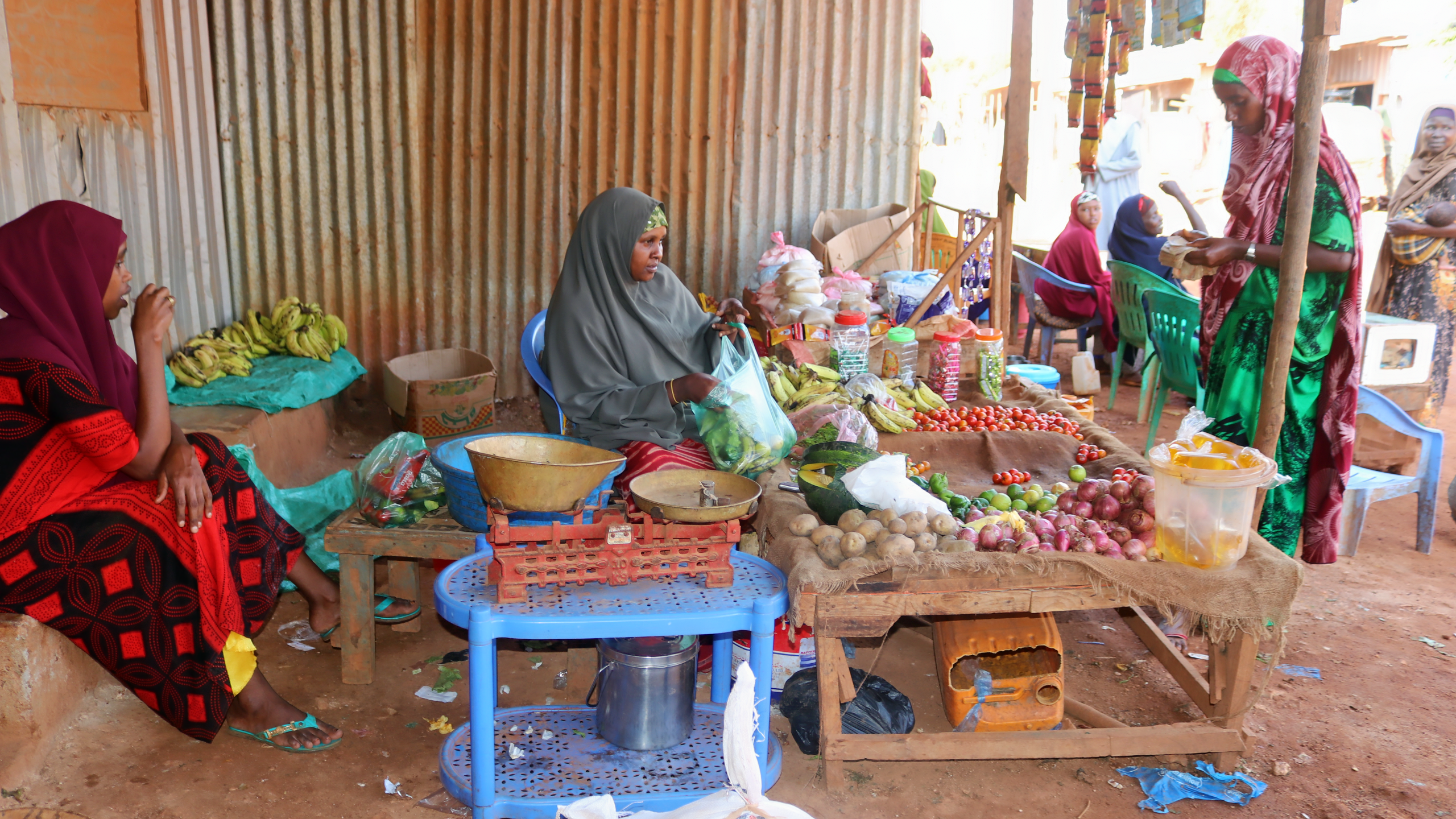
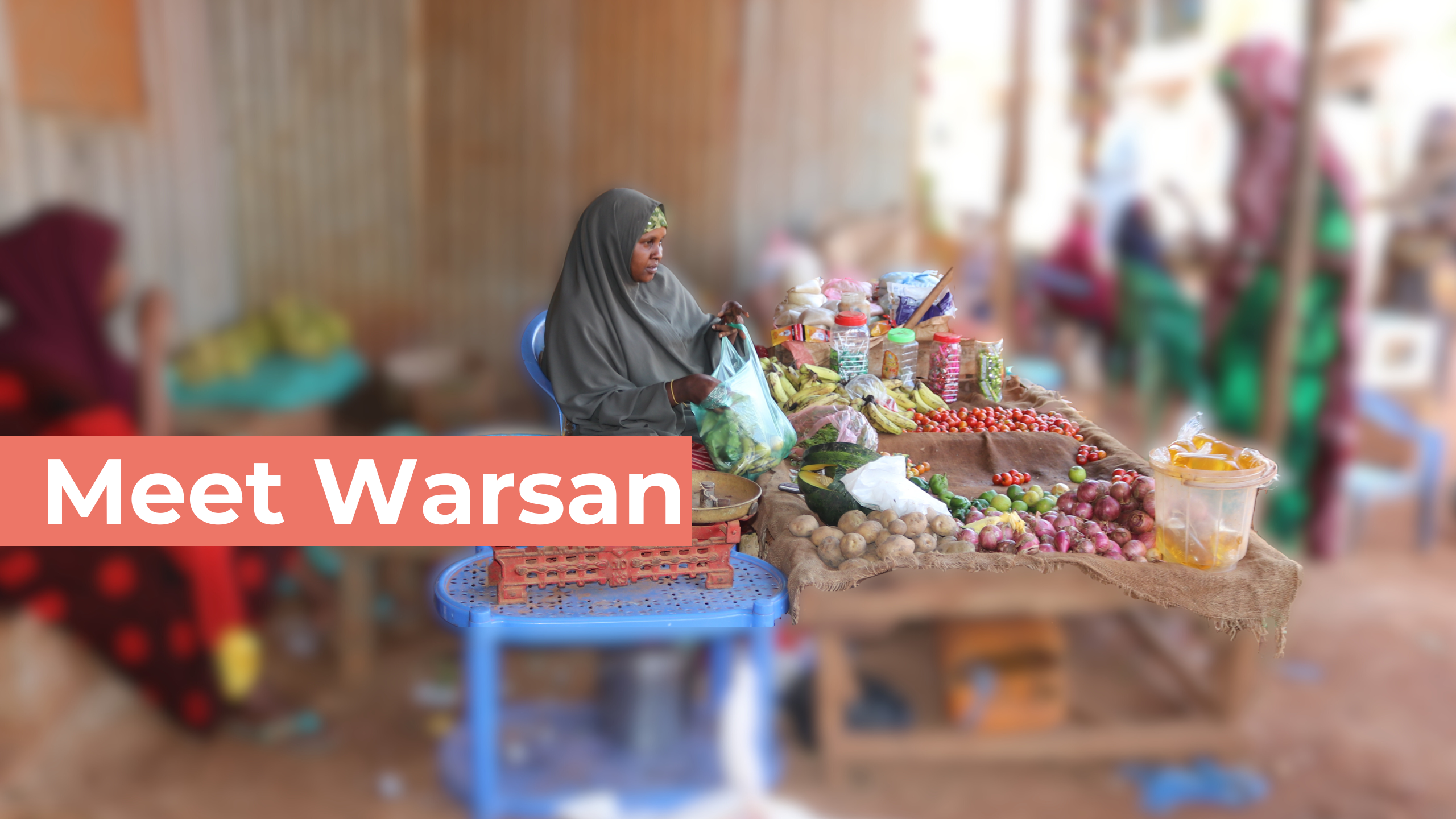
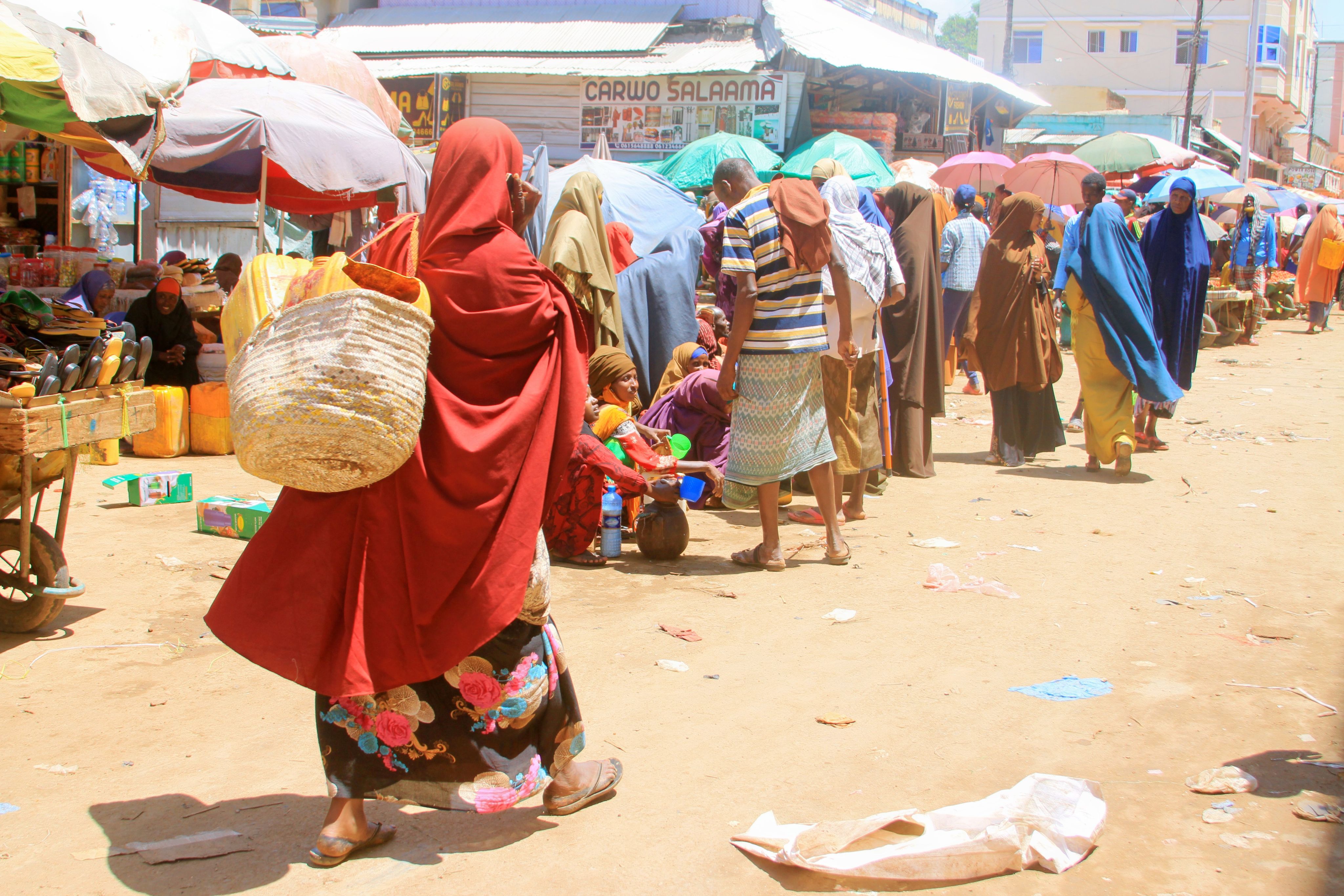
Contrary to what I believed before meeting them, the businesswomen of Baidoa who have experienced displacement view themselves as having resilience—a characteristic that gives them a competitive edge relative to others in the market place. They attribute this to support from their husbands and parents, membership in their SHGs, support from NGOs, and their businesses.
The women and their rural families remain important components of one another’s support systems and although many of the women plan to remain in Baidoa Town/Barwaqo indefinitely, more than half hope to continue splitting their time between rural and urban areas. Their greatest successes in recent years have included owning their homes, being able to educate their children, finding a sense of belonging and security, opening businesses, and saving money, and they are optimistic about what they can continue to achieve in the future.
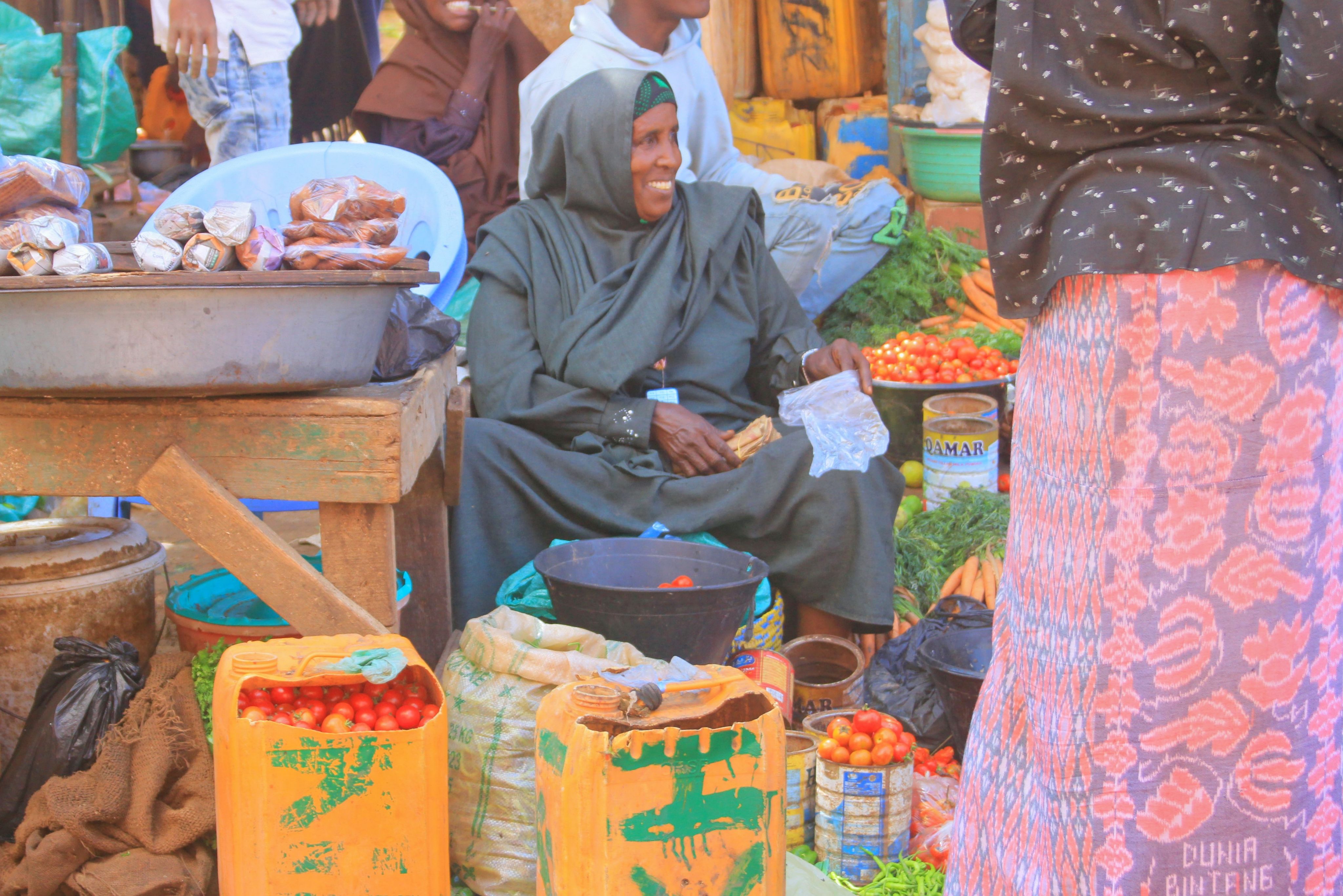
A businesswoman sells various goods in the market. Photo: Khalid Abdi Ibraahim.
A businesswoman sells various goods in the market. Photo: Khalid Abdi Ibraahim.
As my team and I reflected on the interviews we conducted as part of the research phases of the activity, the following recommendations emerged. Click the icons to read more.
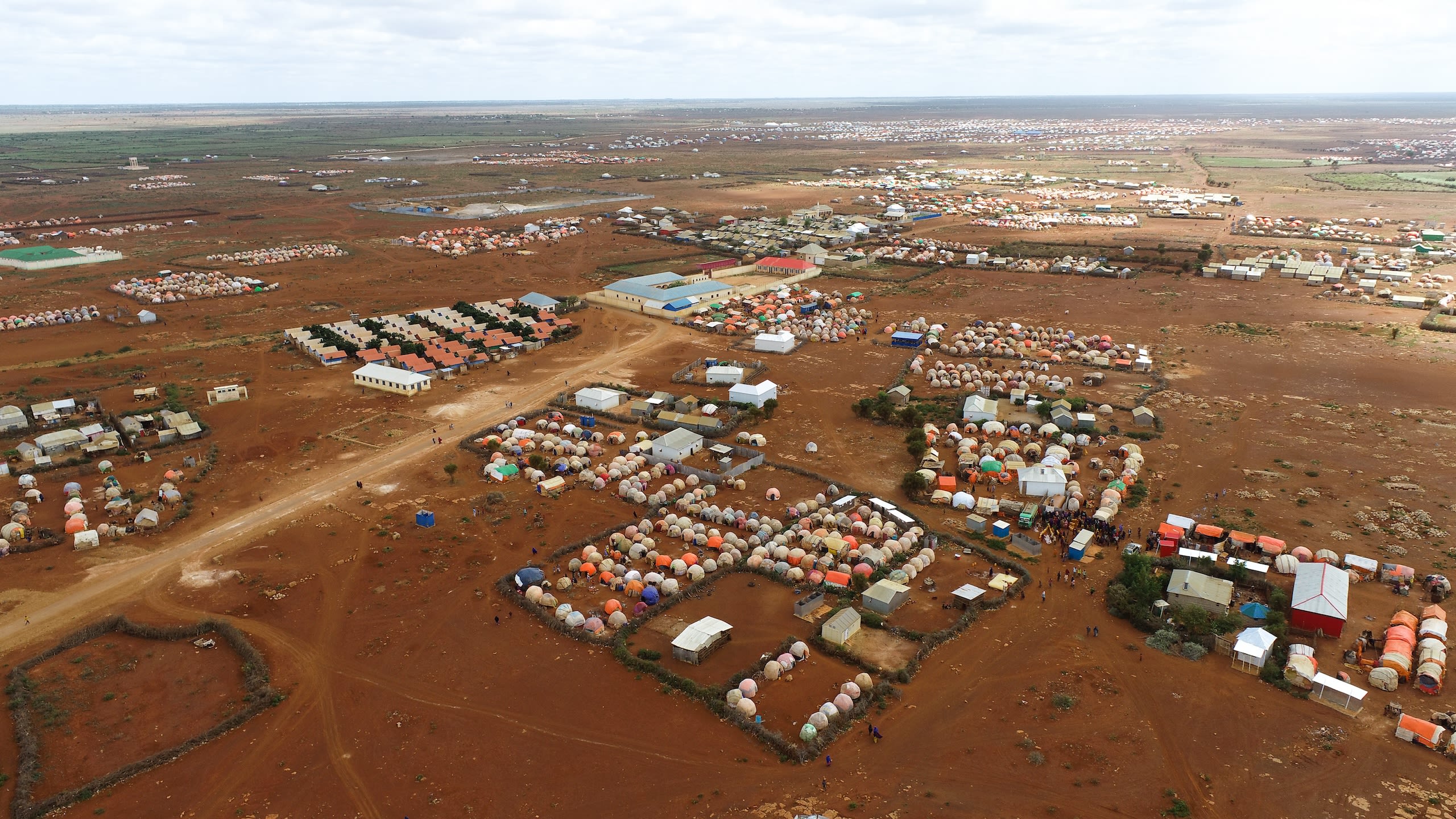
On our way back to Baidoa Town for the co-creation workshop, we were excited to see the women SHG members again; optimistic about bringing them together with representatives from NGOs, local government, and service providers; and hopeful about the potential solutions our group might come up with. We were not prepared for what we would encounter.
On November 4, just three days before our workshop, overnight rains led to flash flooding in Baidoa Town, inundating nearly 400 IDP sites, flooding roads, and sweeping away people’s homes and businesses. Some of the 16 participants from the SHGs lost all of their household items and business assets. This was an important reminder of the harsh practicalities, risks, and challenges that women DACs face and repeatedly overcome: even when they save, invest, and do everything right, one day a flash flood can take everything.
In spite of this, the SHG members demonstrated their dedication, persistence, and belief that their voices could create positive change by attending the workshop.
While most were not used to engaging side-by-side with senior NGO staff, government representatives, and bank staff, over the three days and through the various interactive activities, the participants all got to know one another.
The participants validated the findings from the research and collectively generated concepts for solutions that could improve livelihoods, incomes, and lives of women DACs in Baidoa Town. The group also identified several cross-cutting support services that would be needed to enable these ideas to take shape.
Of my many years conducting research and supporting program design in Somalia, this was the most extensive community engagement process I have ever been part of. Over the repeated engagements with the FGD participants, half- to full-day in-depth interviews with their SHG sisters, and three-day participatory workshop, we really got to know the ladies and to understand their perspectives, challenges, achievements, and aspirations.
I am confident that this process will benefit the upcoming pilot solutions, ensuring that they are driven by local realities and priorities, and offering an existing network of women who are already familiar with and vested in this project.
After a rollercoaster of emotions, I am leaving with a sense of grounded optimism, rooted in the grit, perseverance, and enduring hope of the businesswomen DACs in Baidoa.
Credits
Published December 15, 2023
Written, designed and developed by Jenny Spencer and Michel Alimasi at Untethered Impact based on a learning activity carried out by Raagsan and Untethered Impact.
Additional products developed under this activity include:
- Comprehensive Report on a Multi-Phased Learning Activity
- Women DACs' Lives, Livelihoods, and Linkages
- Mapping Rural<=>Urban Linkages
- Fact sheet
- The video embedded above is also available on vimeo in English and Somali
The learning activity was commissioned by Building Resilient Communities in Somalia under the United States Agency for International Development-funded Scaling Solutions in Somalia Project being implemented by the Danwadaag Durable Solutions Consortium in partnership with Tethered-Up and the Regional Durable Solutions Secretariat.
The USAID Scaling Solutions program strives to scale effective models for durable solutions in displacement affected communities. By leveraging public and private resources, the program aims to generate higher social impact returns on investment, specifically by removing internally displaced persons from Somalia's long-term humanitarian caseload. Furthermore, the program prioritizes enhancing the ways of working within the durable solutions community, fostering cost effectiveness and improved collaboration among stakeholders from various sectors.
For more information about Danwadaag, please contact Laura Bennison, Consortium Coordinator. For more information about BRCiS, please contact Perrine Piton, BRCiS Chief of Party.
